#it’s like mid 60s - 1970
Explore tagged Tumblr posts
Text
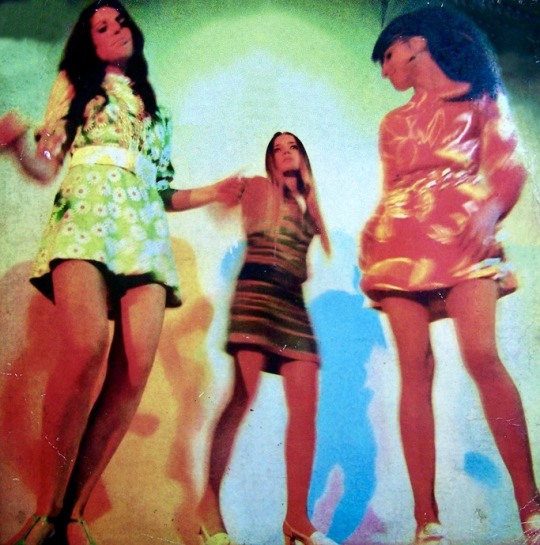
shakin‘ all over - listen to my 60s go go girl inspired playlist here on spotify 🌼
34 notes
·
View notes
Text
how canon do we think those little funeral booklets props are because they kinda imply connor was born in canada??
#there are different reports on connor's age but he's like. early 50s at the absolute youngest more likely mid to late 50s even early 60s#meaning he was born at the LATEST in 1970. according to the funeral thingy logan moved to america in 1972....which would mean.............#have i been a canadian greg truther when canadian connor was right in front of me the entire time????#succession
5 notes
·
View notes
Text
S-M-I-L-E Everyday!

OH THESE WERE SO FUN TO DESSSIGNNNN!! AAAA THEYRE MORE 80s NOWWWWW
Ehehehe catnap comes with his own lil nightcap and pillow!!
Lore below!
The Smiling Critters were Playtime Co.'s most popular, if not most well-known toyline ever produced in the factory. First appearing on greeting cards in the late 1970s, they were suggested to Playtime Co. in 1981 by the chief of marketing, Jimmy Roth, to turn these beloved greeting card characters into lovable, huggable toys. This suggestion then became a reality after Playtime Co. produced the first ever Smiling Critter plushies in 1983.
In the summer of that same year, the Smiling Critters took the world by storm. From selling their own books and magazines, to even debuting on television with specials like “The Smiling Critters and the Forest of Frowns.” and “The Smiling Critters’ Winter Wonderland.”
By 1985, not only did the Smiling Critters receive a TV series that aired for 4 years, but they had theatrical releases that became the highest-grossing animated film at the time of its release.
By 1983 to 1987, the Smiling Critters sold over 60 million plushies and gained over 3 billion dollars in sales during the 80s. With such a commercial success, Playtime Co. introduced 2 of the most popular Smiling Critters, Dogday and Catnap, into Playtime Park in 1985!
When asked why they didn’t just introduce the entire cast of critters, Leith Pierre, head of innovation at Playtime Co. responded with “Well, introducing all of these toys at once might overwhelm our staff and our guests. Both of these toys are one of our newest and most experimental creations, so, if everything goes well, then we do have plans of releasing the rest of the Smiling Critters into Playtime Park. However, our guests’ safety and happiness is our utmost concern here at Playtime Co., and we prioritize that above all else.”
The two critters each had their own little place to take care of. Dogday, being the leader of the Smiling Critters, was in charge of watching the younger guests and making sure everyone was having a great time at the park. Catnap, on the other hand, was in charge of Home Sweet Home, a quaint little area built for kids and parents who just need some time to relax and take a break from all of the ruckus at the park. Home Sweet Home has many beds for little ones to rest and even quiet activities such as drawing and reading for kids and people to enjoy (and with such affordable pricing, who could ever say no?) Catnap can even read to the little ones and for those who have trouble sleeping, Catnap comes equipped with Playtime Co.’s “Sleepy Lavender Scent” to help you relax (guaranteed to knock even the most hyperactive of kids right out!!)
However, not everything was all sunshine and rainbows as tragedy struck in mid 1989. There was a factory error where all of the “Sleepy Lavender Scent” cans for the Catnap plushies were instead replaced with Poppy gas, making kids who owned this factory error experience vivid hallucinations, excessive sleep, and even nightmares. While all of the toys were recalled, this error followed them to Playtime Park, where Catnap was given that same gas. The Home Sweet Home incident occurred in 1989, devastating the Smiling Critters’ reputation. Because of these controversies, the Catnap toy was pulled from the lineup and all promotional material afterwards, and Playtime Park decommissioned Catnap soon after.
Since then, Playtime Co. has done its best to try and repair the Smiling Critters reputation, with Playtime Co. issuing an apology statement the following week. Currently, while the Smiling Critters are still sold in toy stores, they will never reach the popularity they once had in the 80s.
#poppy playtime#smiling critters#poppy playtime redesign#ppt catnap#ppt dogday#dogday#catnap#Playtime Park Au#starz art#WAHAHAHHAHAAAAAAA#LOOOORRRREEEEEEEEE#I love writing lore
420 notes
·
View notes
Text
Mercury Nakshatras Style
In this post, I’ll be observing some consistent fashion styles in Mercury Nakshatras that I’ve noticed and explaining the meaning behind the influence. You can find my analysis on Saturn Nakshatra style [here].
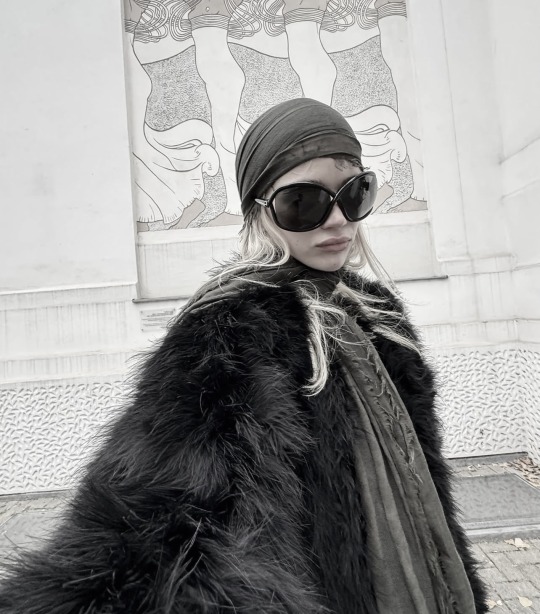
Stella Lucia - Ashlesha ☉
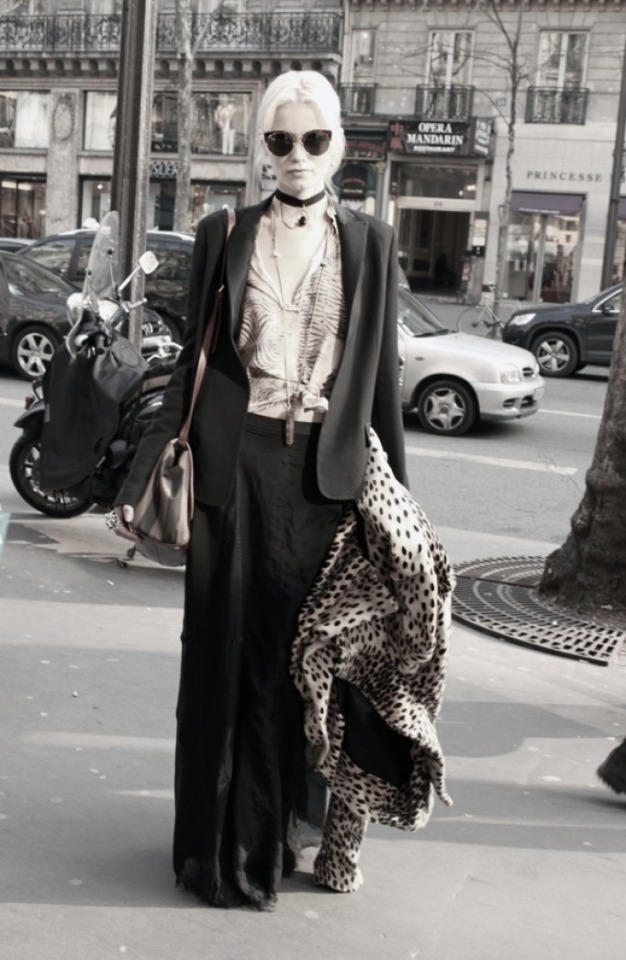
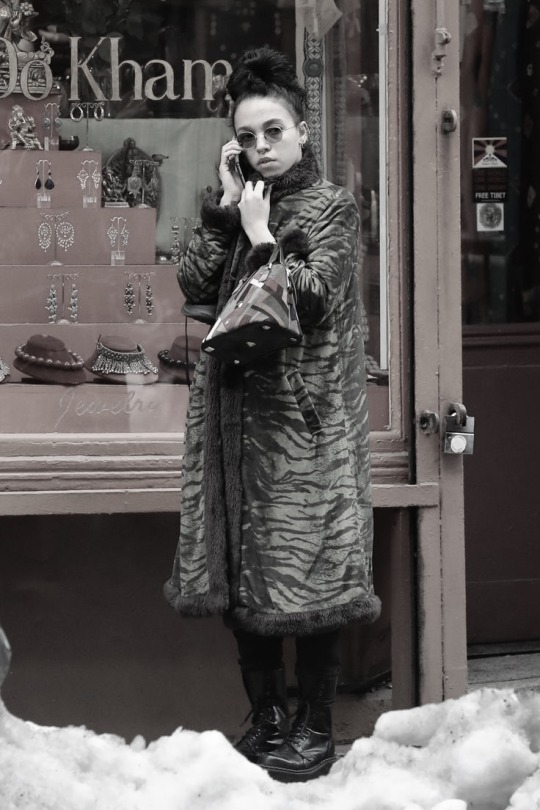
Abbey Lee - Jyestha ☽ ☿ FKA Twigs- Jyestha ☽ ↑
Mercury nakshatra can lean towards a very bohemian-influenced style with flowy silhouettes, layered fabrics—especially patterns—intricate embroidery, and an abundance of accessories like sunglasses, beaded jewelry, scarves, and crystals. Much like Saturn-ruled Nakshatras, there is a deep love for textured materials and chokers. The boho style was most popular during the mid-60s to 70s, often represented by icons like Anita Pallenberg (Revati ☉, Jyestha ☽), who embodied its free-spirited essence.
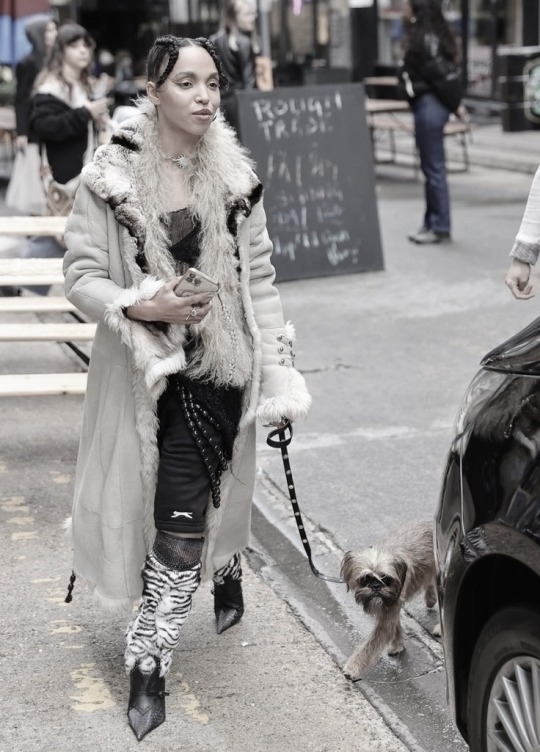
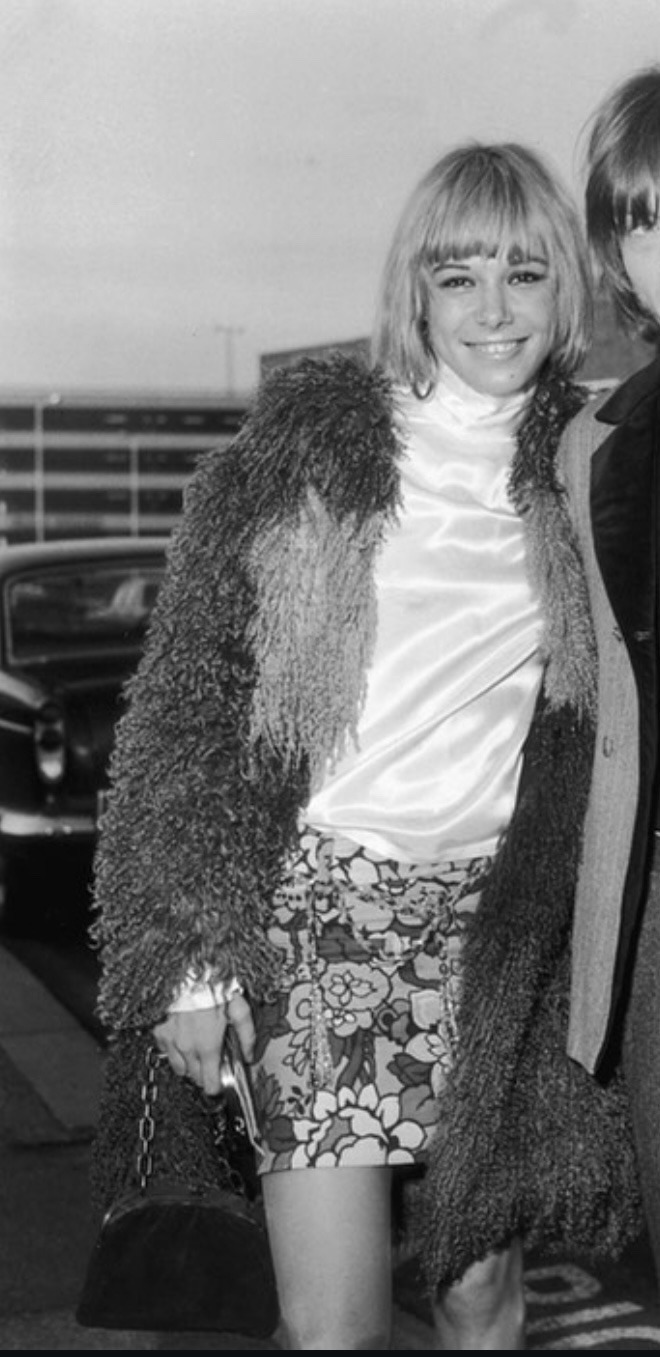
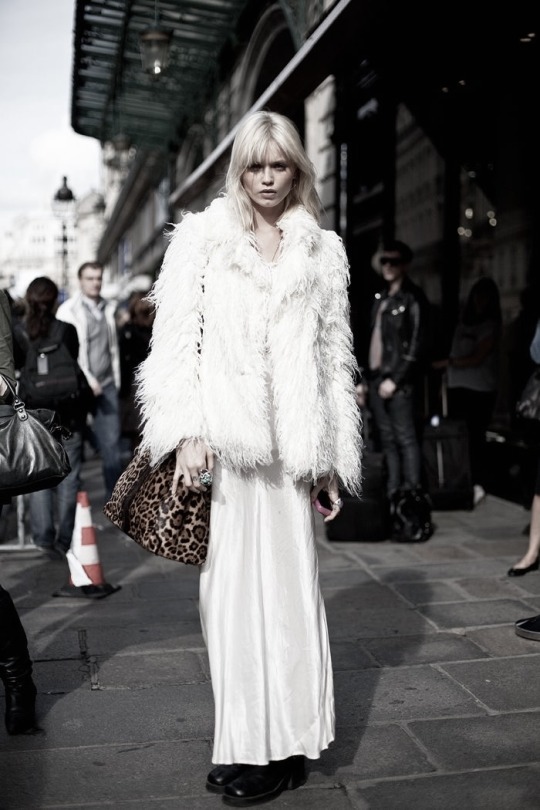
FKA Twigs - Jyestha ☽ ↑
Anita Pallenberg - Revati ☉ Jyestha ☽ ☿
Abbey Lee - Jyestha ☽
At its core, boho fashion represents artistic, intellectual, and creative freedom—a more down-to-earth connection, as if the clothing were effortlessly gathered from different people’s closets. This aligns well with Mercury Nakshatras, as Mercury governs communication, intellect, and how we process and express ideas. With its connection to water sign rulership, there’s a sentimental depth to their fashion—every piece carries purpose or meaning.
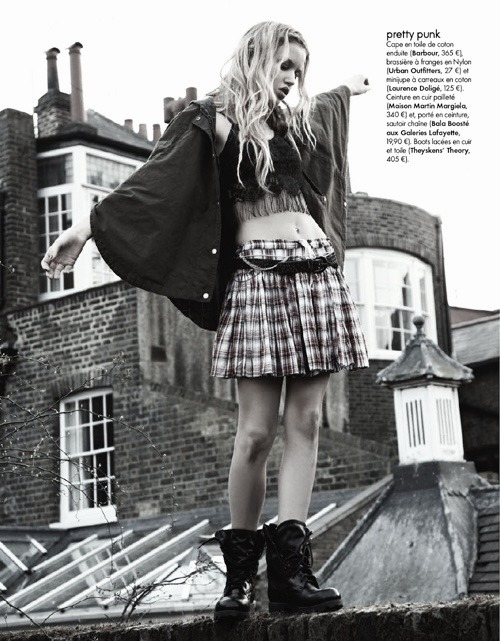
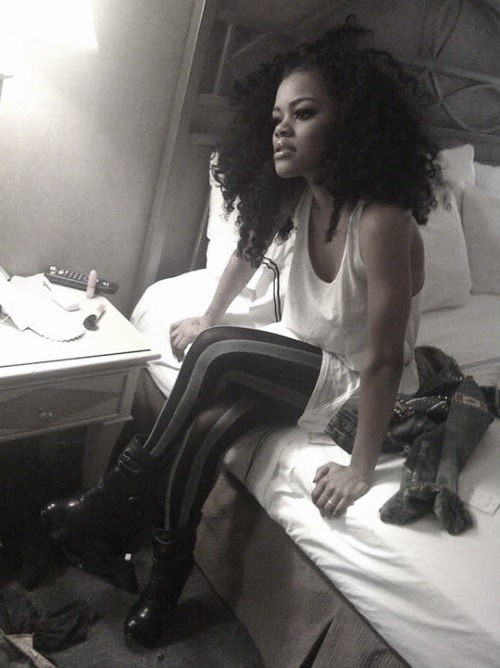

Georgia May Jagger - revati ☽
Teyanna Taylor - Jyestha ☉ ☿
Frances Bean Cobain - revati ☽
Mercury Nakshatras tend to gravitate toward an indie sleaze style, often incorporating patterned tights, combat or ankle boots paired with feminine, petite dresses, oversized ripped sweaters, or band tees—all with a deliberately messy, “unkempt” look. Footwear plays a significant role, especially for Revati natives, as Pisces rules the 12th house, which governs the feet. Meanwhile, Jyestha’s love for combat boots comes from Scorpio’s co-ruler, Mars, which governs war attire and tough, utilitarian aesthetics. Mercury Nakshatras often accessorize with sunglasses and even cigarettes, embodying a hedonistic, unpolished, and authentic style. Mercury itself carries a playful, indulgent nature, making these Nakshatras naturally drawn to a reckless, party-fueled aesthetic—think smudged makeup after a long night out. Much like their Gandanta Nakshatra counterparts (Ketu Nakshatras), they approach both fashion and life with an unfiltered, raw sense of authenticity.
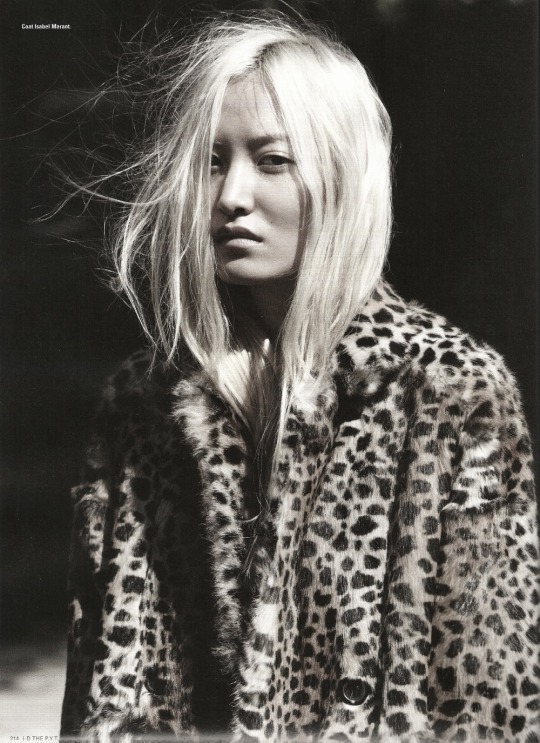
Kim Daul - Revati ☽
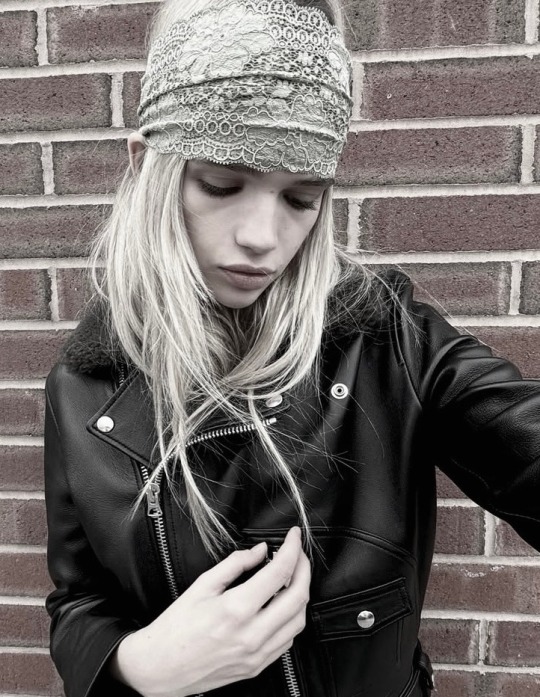
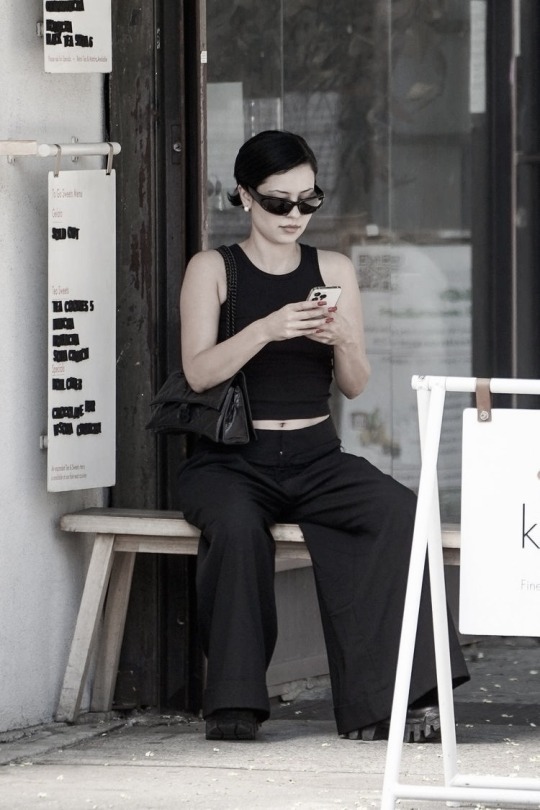
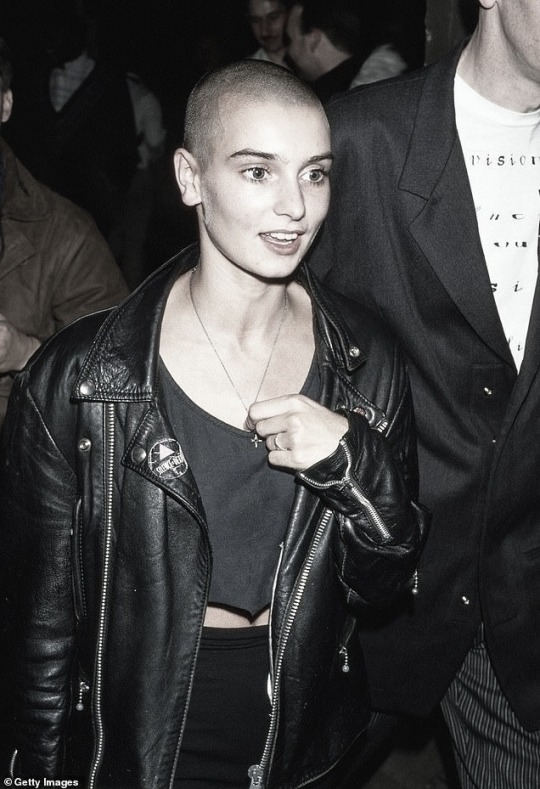
Stella Lucia - Ashlesha ☉
Alexa Demie - Jyestha ☉ Ashlesha ↑ ☿
Sinead O’Connor - Jyestha ☉
I’ve noticed that Jyestha natives often gravitate toward a biker/punk aesthetic, favoring all-black clothing, tank tops, and fitted pants paired with leather jackets. mercury is seen as neutral gendered planet meaning a lot of mercury influence natives can take on a very androgynous and genderfluid look. A perfect example is Vivienne Westwood (Revati ☉, Jyestha ↑), whose revolutionary designs helped define the punk movement as well as breaking boundaries in gendered styling.
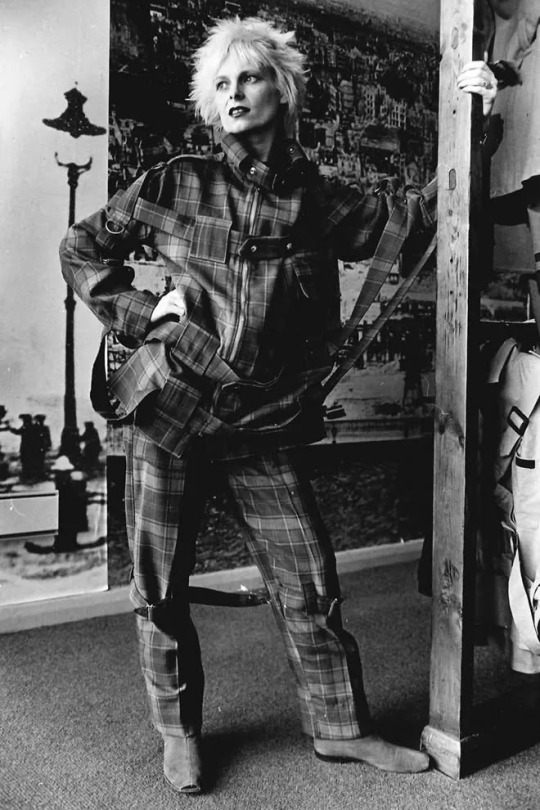
Vivienne Westwood - Revati ☉ Jyestha ↑
Punk fashion, at its core, represents rebellion, anti-establishment ideals, and a DIY ethos—rejecting mainstream norms in favor of individuality and raw self-expression. It emerged in the 1970s as a reaction to societal constraints, blending elements of distressed clothing, leather, spikes, and provocative statements to challenge authority.
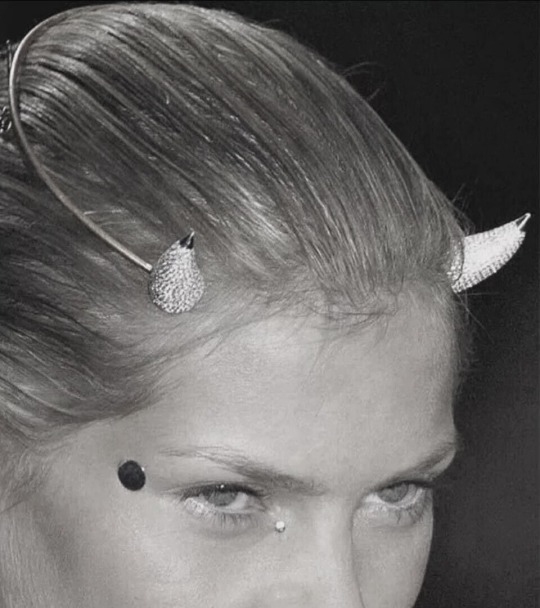
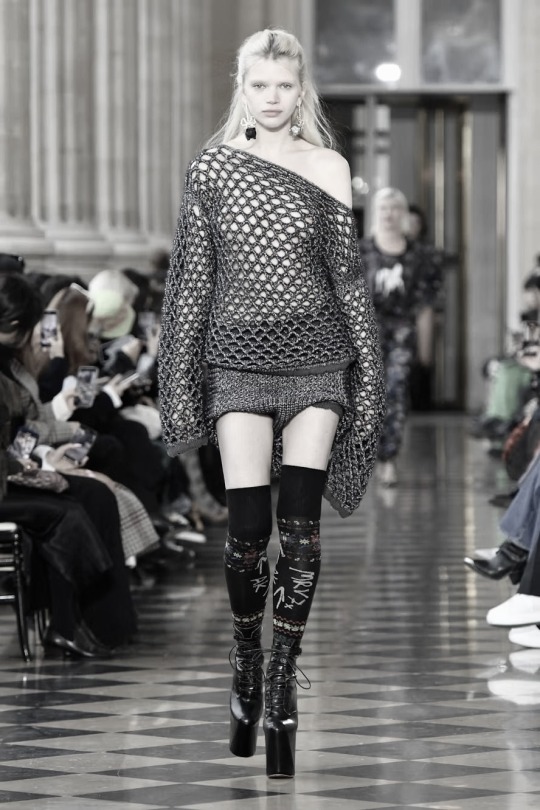
1. Vivienne Westwood “Horned Tiara” the Mercury symbol itself has horns “☿”
2. Stella Lucia - Ashlesha ☉ modeling for Vivienne Westwood
This aligns deeply with Mercury Nakshatras, as Mercury governs intellect, communication, and subversive thinking. Those influenced by Mercury, especially Jyestha and Revati, often use fashion as a form of protest and self-expression. Their style is bold, strategic, and deliberately unfiltered, reflecting both Mercury’s quick-witted nature and Jyestha’s intense, transformative energy. The punk aesthetic, much like these Nakshatras, thrives on pushing boundaries, questioning norms, and embracing an unapologetic, rebellious identity.
#vedic astrology#astrology observations#mercury nakshatra#ashlesha nakshatra#jyestha nakshatra#revati nakshatra
218 notes
·
View notes
Text

In one episode of the Scooby Doo Show, Velma mentioned that she knew Morse code beacuse she was in girl scouts.... when I tell you I SCREAMED because I was ALSO in girl scouts (though I never learned morse code :/ ) and because two of my special interests are scooby doo and vintage fashion, but one of my, like, sub categories of special interests lol under vintage fashion is the history of girl scouts and vintage gs uniforms!! They were sososososoo cute and they changed with the fashion of the times <33 I own a 1939 junior uniform too! ANYWAYS this had to be created. The gang's ages aren't really specified and obviously they haven't aged over the years but since SD started 1969/1970, lets suppose Velma was a girl scout in the early to mid 60s. I put her in a senior uniform and tried to be as accurate as possible. yeah that's it!!!!
#artists on tumblr#scooby doo#velma dinkley#velma scooby doo#traditional art#gouache#girl scouts#1960s#scooby doo where are you
201 notes
·
View notes
Text
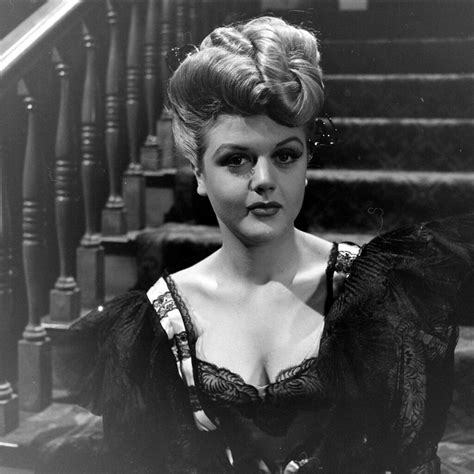
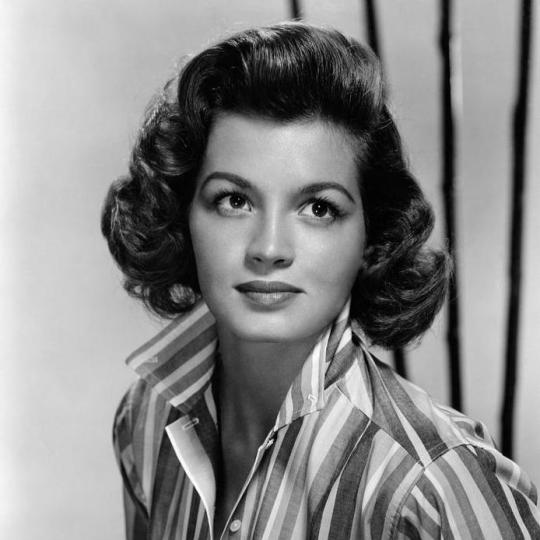
Propaganda
Angela Lansbury (The Harvey Girls, The Court Jester, The Manchurian Candidate)—The babe, the myth, the legend. In her own words her early hollywood roles were "a series of venal bitches" and they were all glorious. Half of them wanted to kill you and you probably would have thanked them. She even goes toe to toe with Judy Garland in The Harvey Girls! That said, she was chronically underused and misused during this era - she was just 36 when she was cast as Elvis Presley's mother in Blue Hawaii and a few years later commented that she'd played so many 'old hags' that most people thought she was in her 60s. She thought she was "all talent, no looks" but she was the full package! Post-1970 I hope we all know what an incredibly talented and compassionate badass she was, but I feel like not enough people know her early roles as a hot (often villainous) young thing.
Angie Dickinson (Rio Bravo, Point Blank, Ocean's Eleven)—Though it could be argued that overall her career leans more to TV, during this time period she was splitting movie title credits with the very top names in the business.
This is round 1 of the tournament. All other polls in this bracket can be found here. Please reblog with further support of your beloved hot sexy vintage woman.
[additional propaganda submitted under the cut.]
Propaganda for Angie Dickinson:
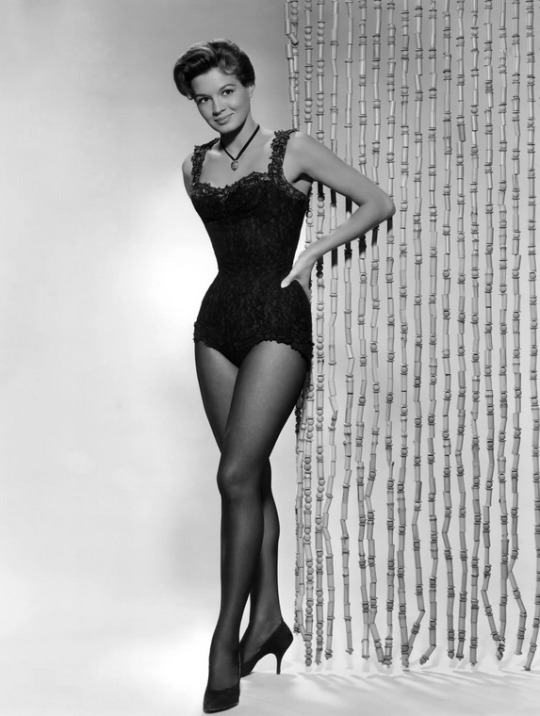
Propaganda for Angela Lansbury:
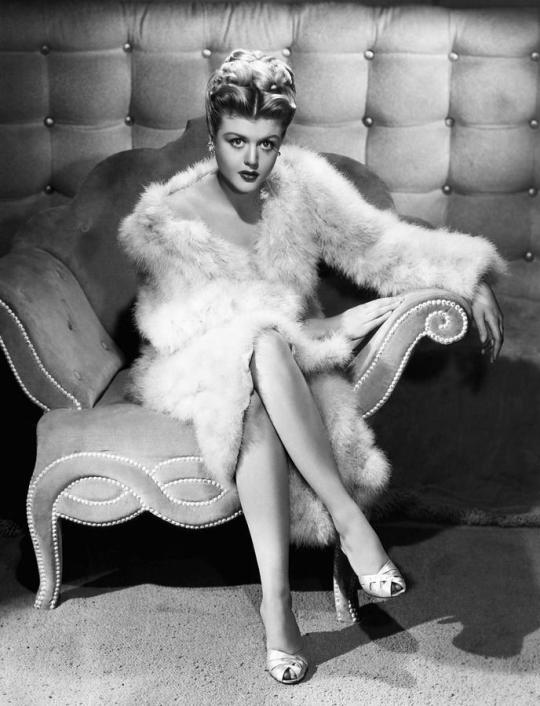
"Angela Lansbury might not be where your mind goes first when you think of hot leading women, because she had a later career revival. But she began acting in the early 1940s after leaving London due to the Blitz. In the first couple decades of her film career she has an openness about her. She said she never really fit in with the Hollywood crowd and to me she gives off a friendly, untarnished vibe."
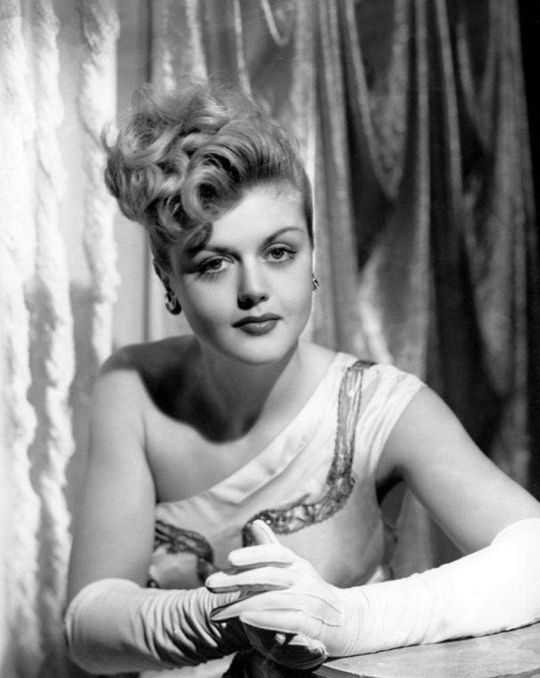
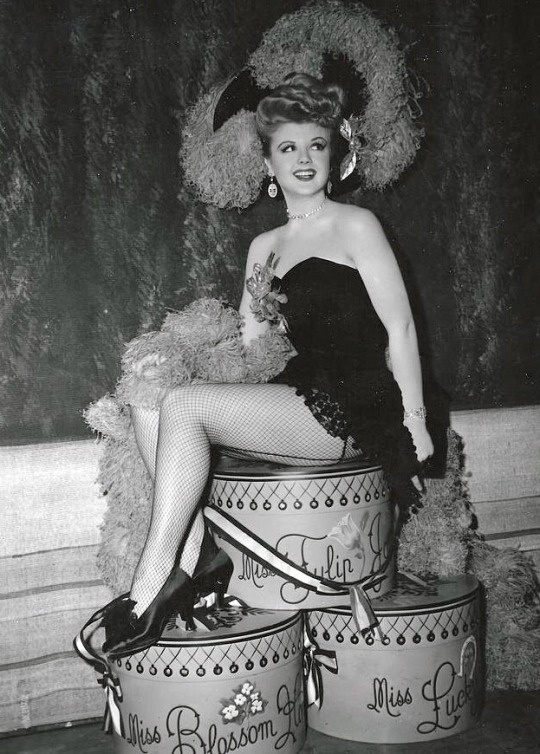
"Most of us know Angela Lansbury as old lady sleuth Jessica Fletcher, but it's important to know that she was smoking hot in her younger days as well as a damned fine actress. Although she didn't get lead roles until her early 40s, at 17 she was a supporting actress in films such as Gaslight (1944), National Velvet (1944), and The Picture of Dorian Grey, for which she won the Golden Globe for best supporting actress and was nominated for the Oscar. Even in her memorable performance as the manipulative mother in The Manchurian Candidate, she is listed as a supporting actress as she does not play the love interest. She was successful both on stage and screen, and won the Tony for her lead role in the musical Mame on Broadway in 1966. TL;DR While Angela Lansbury mostly played supporting roles in films before 1970, she had what it takes to be a leading actress, which we know from her success on stage and tv from the mid 60s onward"
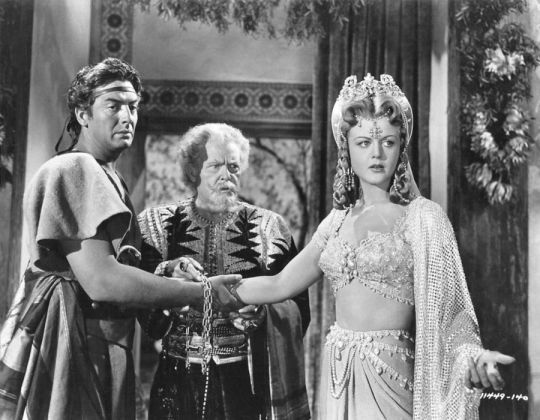
"She looked like a princess but bit like a viper"
"Is there anything this woman couldn't do? Act in comedy and drama, sing, dance, be a wonderful human being - quite simply a true and wonderful lady."
"god she had such an incredible career all throughout her life really but as a young lady she was just as incredible as she was in her later years. enchanting voice, amazing personality, and absolutely GORGEOUS. she lamented not having the looks to play leads in romance but that idea is so batshit because look at her??? she's one of the most terrific women of all time. also she's my grandmother's favorite actress and i truly get it"
"she is the fairytale princess of my dreams in court jester"
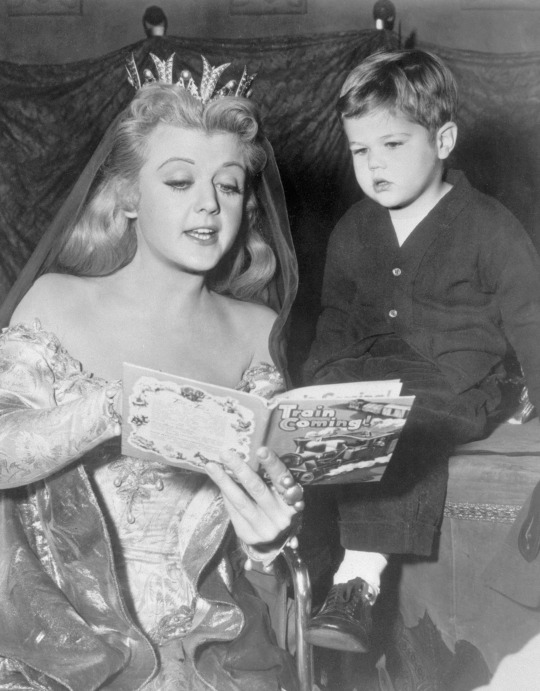
496 notes
·
View notes
Text
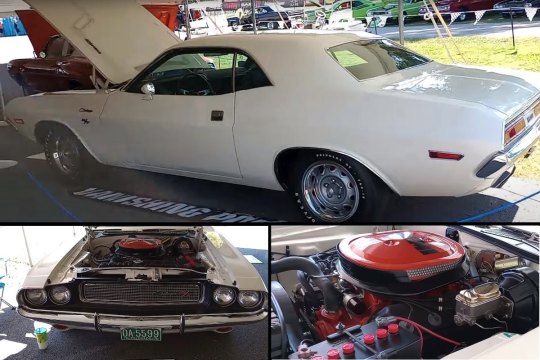
1970 Dodge HEMI Challenger
Once a Battered Movie Star, This 1970 Dodge HEMI Challenger Is Now a Museum-Grade Gem
What's your favorite movie car? Are you into Batmobiles, or do you prefer production vehicles like Steve McQueen's 1968 Ford Mustang from "Bullit?" How about an unassuming Mopar like the white 1970 Dodge Challenger used in "Vanishing Point?"
While not quite as famous as "Bullit," "Vanishing Point" is one of the greatest action films when it comes to car chases. The movie follows ex-policeman and race driver Kowalski delivering a muscle car cross-country to California with the police on his tail. Played by Barry Newman, Kowalski drives a white 1970 Dodge Challenger.
The studio borrowed five vehicles from Chrysler. Four Challengers had the big 440-cubic-inch (7.2-liter) RB under the hood, while the fifth car used a 383-cubic-inch (6.3-liter) big-block. Despite Kowalski talking about the delivery car being supercharged, all vehicles were stock save for suspension upgrades.
Even though it did not receive positive reviews upon its initial release in January 1971, "Vanishing Point" became a critical success in the UK and Europe. This prompted 20th Century Fox to re-release it in the US on a double bill with "The French Connection."
A cult following began to develop in the mid-1970s, and "Vanishing Point" eventually went on to inspire other films, including Quentin Tarantino's "Death Proof" and Edgar Wright's "Baby Driver."
In 1997, Fox released a remake of the film. It starred Viggo Mortensen as Kowalski and has a slightly different plot. Now a Gulf War veteran and former stock car racer, Kowalski is an automobile restorer and delivers high-performance cars to pay his wife's medical bills.
But while the story differs, Kowalski still drives a white 1970 Dodge Challenger. Moreover, Fox went with a HEMI version this time around. The rig you see here is Unit 1, the primary camera car and the vehicle that appears in most close-up shots and high-speed scenes. And yes, it's an authentic HEMI Challenger.
Like most movie cars, it became battered and worn at the end of filming, but it was given a complete restoration and used as a promotional car. Some 25 years have passed since, and the HEMI Challenger is now a museum-grade classic. And it's pretty rare, too.
What makes it scarce? Well, it's mostly the 426-cubic-inch (7.0-liter) HEMI engine. While Dodge sold almost 77,000 Challengers in 1970, only 356 of them left the assembly line with the range-topping mill. The run included nine convertible and 60 R/T SE examples, making this R/T hardtop one of only 287 units sold that year. It's also a four-speed manual car, which narrows it down to one of 137 built.
The HEMI Challenger was recently spotted at Holley MoParty in Bowling Green, Kentucky, and you can take a closer look at its perfect body and super-clean engine bay through the video below.
#car#cars#muscle car#american muscle#mopar#moparperformance#moparworld#moparnation#Dodge HEMI Challenger#dodge challenger#challenger#dodge#HEMI
57 notes
·
View notes
Text
SSO timeline (REWORKED)
Consider the old timeline outdated! I’ve found new timestamps and made a few guesses based on character ages and relations to each other.
We have a few things to go off of: It’s been 20 years since Catherine died, and it’s been 45 years since the baroness left Mr Sands and Thomas was born. The old sisterhood, canonically all being born in 1977-1978, should be in their mid 40s. While I used to say Elizabeth’s age was a good jumping off-point, I think 47 is a bit too old considering the other people in her generation (like Sigry and Avalon). It would also make the gap between the failed sisterhood and Catherine’s death a bit too large.
So new theory! Sigry is 44 in the journals and probably born in 1977, and that is our reference point for the timestamps going forward. The journal ages are unreliable, but I’ll consider them canon unless contradicted by the games or books. In case of contradictions between different sso media, my canon hierarchy goes: Newer quests (Post-2018) > Books > Older quests > Journal ages > SSL.
I’ll put the source of my timeline claims in brackets. Confirmed, unmovable timestamps will be marked in green. Unclear time estimates will be marked with a ~. Let’s get into it!
1218
Jon Jarl arrives on Jorvik. [Starstable Online]
1702
Bertrude Silverglade passes away, leaving the Silverglade estate in the hands of an unnamed “mysterious relative”. [Starstable Online]
~1773
John Sandman and Rosalinda are born, ~25 years before Rosalinda’s death
1798
Rosalinda dies. She and John Sandman are engaged to be married, so they’re probably in their mid-20s. [The Legend Awakens]
1871
Mr Sanders fishes up a deep-sea creature, likely connected to Garnok. [Starshine Legacy]
1890
Owen D Sands establishes Deep Core Drilling Company on Jorvik. [Starshine Legacy]
~1890-1900
At some point during this time period, Mississippi Jones looks for the horn of Araxia. He is pursued by the presumed dead John Sandman. [Starstable Online]
1903
A cave-in/gas incident kills 211 workers and 14 civilians during a Deep Core drilling. (Sounds very similar to what happened in Old Hillcrest…theories…) [Starshine Legacy]
1904
Deep Core is forced to shut down. [Starshine Legacy]
1921
Beatrice, a soul rider of a former sisterhood, is born. She turns 100 years old in present day. [Ghost Stories from Jorvik]
1933
A former reincarnation of Starshine saves four girls who went missing on a school trip to a grave field north of Jorvik City. (Maybe this would be Beatrice’s eventual sisterhood?) [Starshine legacy]
1936
Annabelle Silverglade is born. [Starstable Online]
~1937-1940
Beatrice’s sisterhood is active.
~1949
Pi is born, most likely right inbetween Beatrice and Elizabeth.
1953
Esmeralda Holdsworth is born. [Starstable Online]
1954
Jasper Holbrook is born. [Starstable Online]
1959
John Sandman is on the Firgrove council. Herman Wetton is presumably born around this time, as he claims to have grown up in the 60s. [Starstable Online and Darkness Falling]
1964
Annabelle Silverglade marries John Sandman. [Starstable Online]
1965
Elsa Einstein is born. [Starstable ad]
~1965-1969
Pi is part of a soul rider sisterhood. [Aideen’s gift]
1970
Evergray is born. [Starstable Online]
1976
Annabelle Silverglade divorces John Sandman 45 years before present day. Thomas Moorland is born. [Starstable Online]
1977
Sigry Varanger and Caroline Westfall are born. [The Prisoner of Pandoria]
1978
Catherine Holbrook is born. [Starstable Online]
1979
Avalon is born. [Starstable Online]
1985
Dr Eiren Doyle is born. [Starstable Online]
1987
Ms. Drake is born. [Starstable Online]
1988
Rhiannon is born. [Starstable Online]
1989
Darko is born. [Starstable ad]
1995
Elizabeth arrives on Jorvik. She, Eva, Sigry and Caroline form a soul rider sisterhood. [Shadows Over Jorvik]
~1996
Catherine joins the sisterhood, but grows distant after a failed light ride. [Starstable Online]
~1997
Caroline goes missing and is never seen again. [Starstable Online]
~1999
Catherine’s horse dies after being part of a dangerous ritual. Evergray is presumably banished shortly thereafter. [Starstable Online]
~2000
Catherine and Thomas get married. Josh B’gosh is born. [Starstable Online, Starstable ad]
2001
Catherine dies. Justin is born. [Starstable Online]
2002
Rania Varanger is born. [Starstable Online]
2003
Linda Chanda, Alex Cloudmill, Lisa Peterson and Anne von Blyssen are born in the same year. Derek, Maya, Tan and Loretta are also born this year. [Starstable Online, Jorvik Calling, Starstable ad]
2010
Madison Hightower is born. [Starstable Online]
2011
Rhiannon arrives on Jorvik, ten years before the beginning of SSO. [Starstable Online]
2019
Lisa Peterson arrives on Jorvik, two years before the beginning of SSO. [Starstable Online]
2021-2022
Main story of Starstable Online.
63 notes
·
View notes
Text
They killed our Jesus: A Lament for Generation Jones
Two things happened in 1980 that would ensure the iron grip of the fascist state would (first slowly, then quickly), tighten on the entirety of the nation's populace from that moment forward: Ronald fucking Reagan was installed as president, and a CIA-psyop'd Christian Nationalist shot and killed John Lennon.
Those two things are connected.
First let's look at exactly who "Generation Jones" encompasses, and specific moments in the generational timeline that defined our future. The wiki page is actually quite good. Here's an excerpt that really hits it on the head:
"The name "Generation Jones" has several connotations, including a large anonymous generation, a "keeping up with the Joneses" competitiveness and the slang word "jones" or "jonesing", meaning a yearning or craving.[17][18][19] Pontell suggests that Jonesers inherited an optimistic outlook as children in the 1960s, but were then confronted with a different reality as they entered the workforce during Reaganomics and the shift from a manufacturing to a service economy, which ushered in a long period of mass unemployment. Mortgage interest rates increased to above 12 percent in the mid-eighties,[20] making it virtually impossible to buy a house on a single income. De-industrialization arrived in full force in the mid-late 1970s and 1980s; wages would be stagnant for decades, and 401Ks replaced pensions, leaving them with a certain abiding "jonesing" quality for the more prosperous days of the past.
Generation Jones is noted for coming of age after a huge swath of their older brothers and sisters in the earlier portion of the Baby Boomer population had; thus, many note that there was a paucity of resources and privileges available to them that were seemingly abundant to older Boomers. Therefore, there is a certain level of bitterness and "jonesing" for the level of doting and affluence granted to older Boomers but denied to them.[21]"
That sets the stage, for the most part. I was four when JFK was shot on TV. I was a wide-eyed, open-eared five year old when The Beatles were on Ed Sullivan and The Supremes were on the radio. I was ten when we landed on the moon, and I wanted to be a hippie at Woodstock at eleven. "Basketball Jones" came out when I was 12...I jonesed for a telescope because SPACE and got one from that great maker of fine telescopes, KMart.
Generationally, we jonesed to be ten years older, so we could have had all the cool shit THEY had. They had The Beatles, and we had the solo Beatles, they had Hendrix, Cream, Jefferson Airplane, and we had the fucking BeeGees and disco. It's like we, as a generation, were fated to live The K-Mart Knockoff of Life, instead of the bright, shiny Brand Name One all our older brothers and sisters got.
MUSIC and SCIENCE were EVERYTHING to us as kids/teens...the Eshittification Of Music truly began in 1973, and proceeded through SynthPop Hell in the '80s. Rock and Roll heroes became hairdos with guitars. The rock heroes of the '60s were getting married and having kids and baking bread. AM Radio ceased to be something you listened to for music...it began to replace music with strident, screaming hate voices that would eventually engulf all of AM Radio 24/7/365.
We were continually thwarted most of the way from our young adulthood on, blatantly from the moments in 1980 that the vile Ronald Reagan and the core operatives of evil for the next 50 years took over, and then the moment of what I call "Our Generational Wounding", the murder of John Lennon.
Back in '66, John had inflamed all the grandpas of todays magats by saying (truthfully) that with teens, The Beatles were more popular than Jesus. Beatle hate became a Very Big Thing in Bumfuck South Texas. Record burnings, merchandise burnings, book burnings, all were commonplace. A very palpable, and very specifically "Anti-Beatle" hate got instilled in a lot of kids/teens at that point, so anything to do with the Beatles was taboo for "good people" (read Southern Baptists) to like.
That, of course, made me love them that much more, and to follow their paths from their breakup forward with 'bated breath, buying every 45 they put out, trying to save pennies up to buy their albums.
John was the radical hippie, the one who wanted peace, the one with the weirdo wife, the one who held a "Bed-In" for peace. In a very fundamental-to-our-generation way, John Lennon was OUR "Jesus".
Richard Nixon (president from '68 to '74) HATED him.
In 1971, there was a true mass consciousness that incorporated us along with our older siblings, a musical mass consciousness. I became aware of many things in 1969, specifically fall of '69, so I was experiencing all this in real-time, as it happened. When the news that The Beatles officially broke up came across the AM radiowaves in May of '70, it was A. Very. Big. Deal. Everyone watched everything they did from that point on with GREAT interest.
George put out "My Sweet Lord" and "What Is Life" (first record I ever bought), John put out "Instant Karma", "Mother", then "Power To The People", then "Imagine". Ringo put out "It Don't Come Easy", and Paul & Linda had "Uncle Albert/Admiral Halsey". EVERYBODY was a "post-breakup Beatle critic", panning Paul's very first solo 45 "Another Day", "Uncle Albert" was the followup. This band called Badfinger that sounded suspiciously like The Beatles appeared on American radio, and would make 1972 one of the final "Golden Years" of AM Rock Radio.
In 1970 we heard about this Elton John guy, by the end of '72, I was playing as many of his songs on the piano as I could figure out. My favorite album was (still is) "Madman Across The Water". When "Goodbye Yellow Brick Road" came out in '73, a very noticeable shift was occuring.
Pop became much less political. It softened. It mellowed. It grew its hair long and lived in the country, learned how to grow potatoes and play the mandolin, making Country Rock the one lasting "legacy" of our sad sub-generation. By the time I graduated HS in May of '77, it was all there was on the radio, besides....disco. Oof.
One of my first TV memories was JFK getting shot. That was the Generational Wounding of our older brothers and sisters. When Mark Chapman (a Christian nationalist who changed the words of "Imagine" to "Imagine there's no John Lennon") shot John in December of 1980, it was the 2 in the 1-2 PUNCH done to our OUR generation. The first, of course, being the installing of Reagan and the evil Evangelical influence beginning in earnest.
It also began the buildup of the "Holy War" radical right, and an utter denial and clampdown of "hippie", of "counterculture" in general began, ensuring that John's vision of world peace would never come true, at least not on their watch. They had, effectively, killed OUR Jesus, along with our chances of the kind of security our older sibs got in spades. It also marked the unholy marriage of the evangelicals and the republican apparatus.
When Reagan got elected by virtue of the vile Newt Gingrich's 'Southern Strategy', a clampdown in earnest on the very SPIRITUAL EXISTENCE of our generation's incredible want and need, our collective JONESING for world peace began. Richard Nixon had planted the seeds. Nixon hated John Lennon with a passion. After Reagan was elected, I firmly believe Chapman was "activated" and they killed John as a Christmas present to Nixon.
It was after that, when the dream of a scientific future began to die, as well. When we were in high school, SCIENCE WAS EVERYTHING, so we wanted to be some kind of scientist "when we grew up".
I dealt with four years of college, majored in Biology, and in early 1981 realized my dream of being a Forest Ranger in Yosemite or some other national park somewhere, living in a cabin, giving talks to visitors about the biology aspects of the park....all that went POOF, almost instantaneously. My degree would get me nowhere, so I left before the end of that year and started working in record stores.
I was effectively the Cusack character in the movie about record stores, but it led to a dead end. Record stores weren't all that glamorous, and yes, the pay was dogshit. I tried working in record stores for the love of the music, while trying to BE a musician in a town FILLED OVER FLOWING with musicians, but that was quickly shat on by the beginning shrieks of late-stage capitalism.
It was like working in the record stores was my trying to keep holding onto the dream, our generation's dream...John's dream of world peace (along with my dream of being a working musician) died a pitiful death by the end of 1986.
What followed was nothing but a series of Jobs I Hated, and the beginnings of the true Jonesing for the life we'd been promised, because we didn't get the raises, the pensions, the house, the car, boat and camper, none of that shit for us. A life of being a low-paid, no-insurance drub, destined to be a life-long renter, unless a financial miracle happens.
So when people ask why we (as a generation) hate Ronald Reagan so much, let's just say I'm with Bugs on this one.
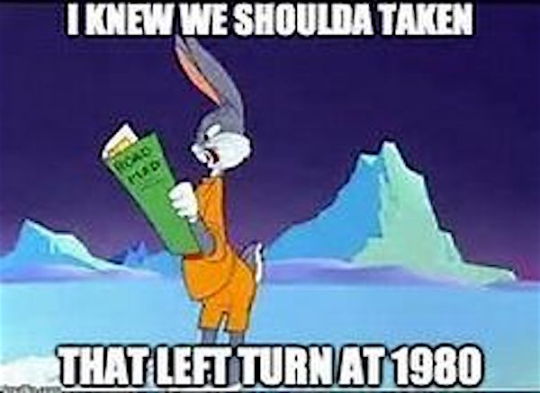
376 notes
·
View notes
Text
Bonded: Part 4
Baby What You Want Me to Do
A/N: Here is the next part to the vampire series I started last Halloween! Things are heating up as we move from 1960 to 1970 with vampire Elvis and our vampire reader. I hope you enjoy!
Need to catch up?
Part 1
Part 2
Part 3
Warnings: 18+ minors DNI, kissing, cussing, fingering, oral sex (f receiving), penetrative sex, unprotected sex, creampie, but they're vampires so also blood drinking, biting, and someone with a pretty serious illness
Word count: ~3.8k

December 1970
He prays desperately that they'll find you. You're his only hope.
Elvis paces the TV room at Graceland smoking his cigar much too quickly. What will he do if the guys can't find you? He's talked to three different vampires and they all refused to help him. Surely, once he explains, you'll do what he needs.
There's also a small part of him that just wants to know where you are, wants to see you again. He's wondered where you were so many times over the last decade and he almost broke down and looked for you on several occasions. But he was never as desperate as he is now.
He sits down on the couch and stares absentmindedly at the TVs as they play three different football games. Hopefully Sonny and the guys can find you. They have to find you.
******
You leave your job at the Moulin Rouge not long after your encounter with Elvis. People start to notice that you aren't aging. But more than that, everything there reminds you of him. So you pack up and move to Rome. You bounce around Europe for the better part of the decade and then decide you'll go home to America. By the mid ‘60s there are more soldiers, but you have no interest in living in Vietnam. Besides, you’re getting a little tired of the routine that keeps you alive. Several times you consider giving up entirely and letting yourself fade, but there’s always a reason to keep going, even if it’s just that you have to go to work the next day.
You watch Elvis's career from afar, see every single one of his movies, and cry when you watch the Special in ‘68. That's when you go home, settling in Las Vegas to become a showgirl. There is a steady stream of male tourists and, if you’re being honest, the vague chance that you might run into Elvis. In a way, you’re happy, despite living alone. After Paris, you stop looking for others like you and learn to be content to live in isolation. Even after all these years, the only one you really want is him.
You get invited to one of his parties once by some guy who is trying to show off, but you bail at the last second, scared of how he might react to seeing you again. He’s married with a child, why would he want to reconnect with the woman who ruined his life? Still, his life doesn't seem ruined when you read what the papers have to say about his grand return to the stage. You're happy he’s happy and you make that be enough.
******
Elvis walks upstairs to Lisa Marie’s room and stands in the doorway for a little while just watching the scene in front of him. His little girl lays in the bed asleep as the nurse sits beside her waiting for the next coughing fit.
“How is she?” He whispers and the nurse looks up at him.
“Not any better. The doctor is worried that the whooping cough will turn to pneumonia. If that happens-”
“It won't.” He can't entertain that possibility in his mind. She's already too sick. He walks over to the bed and kneels down beside it, looking at his toddler daughter struggling to breathe on the pillow. She's not even 3 years old. “I won't let it happen.”
“Mr. Presley, I know it's hard to think about, but she's not responding to the antibiotics. You need to-” He turns to her with his eyes burning and cruel. It's easy to forget he's a vampire until he looks like this. The nurse doesn't know, of course, but she's filled with an icy cold terror anyway.
“I've already fired three nurses for talking like this. Do you want to be next?” He spits it at her and she shakes her head vehemently.
“N-no sir. I'm sorry.” She shrinks like a mouse in front of a violent predator. Elvis glares at her, nostrils flaring, and seriously considers draining her dry. He hasn't fed in days and he feels his fangs descend just thinking about it. Shaking his head a little, he turns back to face the bed and takes a deep breath to get rid of his fangs.
“You just do your job. Leave the rest to me.” He lifts Lisa Marie’s hand to his lips and kisses it gently. “My baby will be just fine.”
The nurse nods as he stands up and walks to the doorway, pausing to look back at the bed.
“She will be fine.” He has to find you before it's too late.
******
You read in the papers that Elvis is back in Vegas at the end of January 1971. Every time you find out he's there, your heart skips and you try not to pray that this is the time you run into him. You attempt to go about your business as usual and ignore the strange pull you feel to reach out to him.
It takes every amount of threatening from the Colonel to get Elvis to go back to Vegas while Lisa Marie is sick. Her whooping cough does turn into pneumonia and she just seems to get worse with each passing day. Elvis has her moved to a hospital in Vegas so he can be with her any time he's not on stage.
In the meantime, the men he's sent to search for you continue to come up empty handed. Nobody at the Moulin Rouge knows where you are and none of their other leads go anywhere. Mary hasn't spoken with you since the day Elvis was turned. And even though they find Anya back home in Russia, she doesn't know where you are either. Last she heard, you were going back to America, but she wasn't sure where you'd gone.
Elvis breaks almost every knick knack in his Vegas suite flying into fits of rage over their incompetence. He could've told them you were in America. There's a strange feeling in him that tells him you're close by, he's just not sure where.
So when he sees you one day crossing the street in front of him on his way to the hospital, he almost doesn't believe it's you. But he'd recognize you anywhere, even with his eyes closed. For some reason, his extreme senses pick up on you better than anything he's ever experienced. He can smell you and hear you despite the bustling city around him.
Without warning, he unlocks the door and hops out of the car, ignoring the pleas from his bodyguards. He's stronger than all of them combined, so they don't even attempt to hold him back as he runs across the street to you.
You feel him before you see him, his scent almost overwhelming you. Your eyes close and you stop dead in your tracks as he comes up behind you.
“Y/n…”
“Elvis.” You turn to him, opening your eyes slowly. For a second, you both just stare at each other.
“I need you.” You're not sure what you were expecting to come out of his mouth, but it wasn't that.
“You… need me?”
“Yes. Please. Come with me.” You're on your way to work, but you don't think twice.
“Okay.” He leads you back through traffic to his car where it's parked as his bodyguards wait for him to come back. Sonny stands there, not sure what to think about the kind of woman that makes Elvis Presley jump out of a moving car.
“What the hell, boss?” Elvis just shakes his head.
“I told you she was close, man.” Sonny's mouth pops open.
“Is that… she's… that's her?” Elvis nods as he opens the door for you to slide into the backseat.
“That's her.” He slides into the seat beside you and slams the car door. You can't get over how good he looks in his velvet jacket. His hair is a lot longer than the last time you saw him, but he's just as handsome as he's ever been.
“Elvis…”
“I need your help. I've been looking for you.” Your body is screaming for you to pull him close to you, but you try to ignore the instinct.
“For me? Why?”
“You'll see.” You ride in silence, not sure what to say to the man you've loved for over a decade when you haven't seen him in just as long. When the car pulls up in front of the hospital, you really start to wonder what he wants with you. “Don't say anything to the press.”
He doesn't give you time to ask any questions before getting out of the car and running to your side to help you out.
“Elvis, what-?”
“Just come with me.” He puts his hand on the small of your back, sending shivers through both of you, and leads you past the paparazzi and through the hospital to Lisa Marie's room. At the door he turns to you with a strange look of desperation on his face. His distress is almost palpable. “I need your help with this.”
He pushes the door open and guides you into the room. When you see the little girl in the bed, oxygen pumping and monitors beeping, your hand goes to your mouth.
“This is my daughter, Lisa Marie. She has pneumonia and it's not responding to the medication.” Your eyes fill with tears, his sadness overwhelming you.
“What do you need from me?” He hesitates for a second and then decides he has nothing to lose.
“I need you to help me turn her into one of us.”
His request hangs in the air like some tangible thing. It takes a second for you to really register what he's asking, before you turn to him with your eyes wide.
“Elvis, she's a child. She's a baby. I'm not-”
“She's dying, y/n. I can't lose her.” You feel the desperation roll off of him in deep waves and look back at the toddler in the bed. For a second, you consider what it would mean.
“No, Elvis! I'm not doing this!” You turn and walk out of the hospital room. In the hallway, you lean against the wall and try to catch your breath. His emotions are making it difficult to think. You don't remember being this sensitive to him before, but it's like the years apart have made your senses even more extreme. There's always a strange sort of connection between a vampire and their maker, but yours seems to be especially strong. Or maybe his feelings are just that intense.
“Y/n! Please. You're my only hope of saving her.” His blue eyes burn with desperation.
“No!” You yell at first and then lower your voice when you realize the nurses at the desk are watching the two of you. “I'm not doing this, Elvis. I can't.”
He grabs your shoulders and shakes you a little, not hard but enough to feel.
“You have to! You did this to me! You owe me this!” He's frantic now, almost hysterical with the thought that you're refusing to do what he needs. You reach up and take his face in both hands.
“Elvis. Not here. Not like this. People are watching.” He blinks a few times and lets go of your shoulders, looking around. He sniffs hard and takes his glasses off to wipe his eyes. Placing them back on his nose, he looks at you intensely.
“Okay. Come with me.” He takes your hand and drags you back through the hospital to his car, ignoring the reporters as they yell questions about who you are and why he's at the hospital. Back in the safety of the car, he breaks down. “I don't know what else to do.”
He leans over in your arms and you hold him as he cries on your chest. Tears stream down your cheeks and your body is wracked with sobs. You're not sure if it's his sadness or yours that's got you like this, but you hold him and rock with him in your arms the whole way back to his hotel.
When you pull up, he groans and sits up, wiping his face with his hands. He pulls a handkerchief out of his pocket and hands it to you to wipe your face with. You're not sure why he didn't use it himself, but it's like that would be admitting he had cried. Once you're both cleaned up as much as you can be, he opens the car door and leads you up to his suite. As soon as you're alone, he rounds on you. His eyes are so much on fire that they're almost red.
“Tell me again why the fuck you won’t save my daughter’s life.”
“Elvis, think about what you're asking me. You want me to help you make your baby a vampire.” He turns and kicks a table.
“I want you to SAVE HER LIFE.” He snarls at you angrily. You decide that yelling back is not going to be helpful. Instead you take a deep breath and ask quietly.
“Did I save your life?” He stares at you.
“What?”
“When I turned you, did I save your life?” You say it slowly and deliberately and watch as he puts together what you're asking.
“No, but I wasn't dying.” He seems to have softened a bit though, so you continue this line of questioning.
“And are you happy that I turned you?”
“Not really.” The bitterness in his voice cuts straight through you.
“Is this the life you want for your child?” That strikes a chord and he looks up at you with his eyes cold again.
“I didn't want this life for myself.” Now it's your turn to shake your head and get a little fired up.
“Oh no you don't. You do not get to blame this on me. You begged me to turn you.” You watch as he puffs up again and prepares for a fight.
“And you knew better!”
“I told you-”
“BUT YOU DID IT ANYWAY!” He walks close to you and towers over you. “YOU DID IT ANYWAY!”
“YOU DIDN’T GIVE ME AN OPTION!” He scares you a bit, but you refuse to back down. “YOU-”
“AND THEN YOU SENT ME AWAY!” You laugh derisively.
“I sent you away?! Are you fucking kidding me?!” You take a step towards him and look up into his face. “You left me!”
He grabs your upper arms and shakes you again.
“DO YOU THINK I WANTED TO LEAVE-” You cut him off and scream.
“DO YOU THINK I WANTED YOU TO LEAVE?! I LOVED YOU!” He lets go of your arms and his mouth pops open, but he closes it quickly and turns away from you. You whisper to his back. “I love you.”
You try to suppress your tears, dying to know what he is thinking. He doesn't give you long to wonder, though. Instead, he turns back to you with a tortured expression.
“Why the fuck didn't you say anything?”
“I knew better! I knew you didn't love me!” He shakes his head.
“You decided for me.”
“Are you telling me I was wrong?!” Your voice wavers as the tears threaten to spill over. “You know you didn't-”
And then in three steps he's wrapped around you, his mouth crashed into yours, kissing you with an unbridled passion.
You don't even think, your body just responds and you jump to wrap your legs around his waist. He catches you easily and carries you to the bedroom, his mouth never moving from yours. A decade’s worth of pent up passion is escaping you both as he lays you down on the bed and rolls his hips forward to meet yours. He stops for the smallest second and strokes the side of your face with the back of his fingers. Then he leans in and kisses you softly a few times before the heat takes over again and he tears at your clothes. In a few short minutes he's got you both stripped naked and you press your bodies together, soaking in the feeling of each other’s skin. It's been so long since he's had you like this that he almost forgot what it felt like to be this close to you, but it all comes rushing back to him as you whimper underneath him. He presses his lips to your body, leaving a trail of hot kisses in his wake as he moves down your stomach. His fangs have already descended and he grazes them against your inner thigh in the place where he bit you when you made love before he left Germany. How many nights has he thought of that day? The way you tasted and smelled and how you writhed under his body in pleasure.
You're overwhelmed with the reality of him as he worships you, having spent too many years imagining him, replaying your last time together over and over in your mind with your fingers pressed to your clit, whispering his name into the darkness like a prayer. You feel your fangs against your bottom lip and arch your back as he drags his tongue up your thigh and hovers just over your center.
“You really thought I didn't love you?” He whispers, just before he lowers his mouth to you, letting his tongue dart out over your sensitive bud. You moan softly as he begins to lick and suck you with the fire of a man possessed by desire. Words are beyond you as he works your clit with his mouth and then moves down to press his tongue as deep inside you as it'll go. You whimper and gasp as he fucks you with his tongue and then moves back up, sliding two long fingers into you. The feeling of his rings against your entrance is new and particularly delicious as you feel your orgasm start to gather in between your hips. His fangs press gently into your skin as he licks you hard and slides his fingers in and out. He knows you're close to a climax, remembers the way you feel like this, and is pulling out all the stops to push you over the edge. “Come on, baby. You can let go for me. I'm not goin’ anywhere.”
He's not sure why that's what he says, but it works nonetheless and you feel yourself giving in to the pleasure as it washes over you in pounding waves. He moans a little when he feels you pulse around his fingers. As your clit softens, he pulls back a bit and it takes everything in him not to sink his fangs into your thigh. His dick is so hard it almost hurts and he's dying for some kind of release. He hasn't fed in way too long and the knowledge that you're there and you taste so good is about to kill him.
You watch, confused, as he moves away from you and sits up with his back against the headboard, leaning back and sighing deeply.
“Elvis, what-?”
“I'm trying not to bite you.” You sit up and look at him, so beautiful with his eyes closed and his head thrown back, shaggy hair a little wet with sweat. His body is taut and when your eyes land on his hard cock standing at the ready, your pussy clenches around nothing.
“Why?” You whisper as you slink over to him and crawl into his lap, straddling his thighs and taking his dick in your hand. He groans as you start to pump him and then lean in and kiss his chest. “I don't mind.”
He immediately lifts his head and looks down as you move your hair out of the way and expose your neck to him. It’s been so long and he knows how good you taste. A low growl escapes him as he leans forward and licks a spot on your neck.
“You're sure, baby?”
“Just don't drain me, but yes.” He smiles a little and drags his fangs across your skin. Your hand is still pumping him, but as he moves to bite you, you lift up and sink down onto his cock while his fangs press into your neck. Both of you moan deeply with the double sensation. You roll your hips against him as he sucks the blood from your neck and the passion begins to mount again as both of his hands move to your back. He groans as you begin to bounce on him harder, pushing him so deep inside you that you dance on the edge of another orgasm.
“Fuck, Elvis!” You moan and he backs away from your neck and pulls your mouth to his, your fangs bumping into his as you taste your own blood on his tongue. He moves his hands to your hips and starts to lift and drop you faster and faster, feeling the pleasure rise in him and threaten to explode inside you. Then, he grabs the other side of your neck with his hand and presses his forehead into yours as you fuck him.
“Of course I loved you. I’ve always loved you. I still love you.” You let out a strangled moan at his words and clamp your mouth shut. The instinct to bite him is so strong that you can barely control it. And it only gets worse when he cocks his head to the side and moves his hair off his neck.
“I can't.”
“Yes you can. Please.”
“Elvis…” But it's beyond your control when he moves his thumb to your clit and he pushes you over the edge into another blinding climax. Your eyes darken and the next thing you know, you're sinking your fangs into him as he holds you in place and cums deep inside you. The sweet taste of his blood rushes over your tongue as his cock pulses inside you. The pleasure overwhelms both of you so deeply that for a second it feels like you black out. When you both come to, you're laying on the bed with your head down by his feet and his head by yours. You feel him grab your ankle and kiss it, a smile spreading across your face.
“You okay, baby?” He asks with his lips against your skin. You sit up and rearrange to be in his arms. He kisses your forehead and sighs deeply.
“I'm fine. Better than fine. Are you okay?” You look up at him but he keeps his eyes on the ceiling.
“Yeah, I'm… I love you.” You kiss his jawline.
“I love you too. What is it?” There's a pause as you watch him try to find the words to say what's on his mind. Eventually he just opens his mouth and it comes tumbling out.
“My baby girl is gonna die, isn't she?”
You lay together in silence and the thought hits him that at least he'll have you when it happens.
******
To be continued...
*~*~*~*~*~*~*~*~*~*~*~*~*~*~*~*~*~*~*~*~*~*~*
Taglist:
@ccab @atleastpleasetelephone @aliypop @18lkpeters @dkayfixates @tacozebra051 @your-nanas-house @joshuntildawn13 @lookingforrainbows @60svintage @littlehoneyposts @epthedream69 @louisejoy86 @rjmartin11 @from-memphis-with-love @deltafalax @cinnamoroll-things @burnthheparaphilia @jhoneybees @cattcb @everythingelvispresley @returntopresley @searchingforgravity @msamarican @angschrof @lustnhim @polksaladava @librababe99 @hooked-on-elvis @theelvisprincess @makethemorning @peaceloveelvis @mrspresley69
#elvis presley#elvis#elvis presley fanfiction#elvis fanfic#elvis presley fic#elvis smut#elvis fanfiction#elvis fic#elvis presley smut#elvis presley x reader#elvis x y/n#elvis x you#elvis presley fanfic#elvis presley x y/n#elvis presley x you
78 notes
·
View notes
Note
I just wanted to say how much I love how you keep in mind the 70s for the marauders era. I was a bit surprised that most in the fandom tend to automatically lean more towards the disco bell bottom vibe in their depictions but I always thought they would be more on the British Punk movement in the mid 1970s that was pushed by the youth culture due to social unrest and a desire for rebellion against established norms. So if in muggle clothes my mind tends to lean towards influences from Vivienne Westwood and more tighter clothes like the band Blondie (Debbie Harry is my fashion icon!) but I love all the fashion from that era! (I feel like Sirius is the one does get depicted with these influences the most consistently). And even the snippet of James and Sirius fleeing from the police, I always thought them wearing those T-shirts with the golden phoenixes could have been actual Queen band T-shirts they bought while in the muggle world that they thought both looked cool and could represent The Order at the same time lol
Hi! Yes! I love keeping my jily and marauders canonically in the 1970s because a. its fun and b. I genuinely find the time period fascinating and perfectly fitting for their arcs within canon (lots of civil unrest, societal change etc. etc.)
I agree that the general idea of Lily really does skew towards ABBA, Fleetwood Mac lover (or if we are going modern TSwift girl)....but if you are one of those people reading this I'm really sorry to disappoint because that's not my girl....
I have a very strong head canon that Lily had a very eclectic taste in music and personal style due to many bored summers back in Cokeworth. She would have bopped along to ABBA and loved a good Tusk track from Fleetwood Mac, but I think her music tastes would have probably skewed more pre new wave/punk/glam for a few reasons:
Her best friend was Severus Snape: During our teens we usually glob on to whatever our friends like--it's kind of natural because navigating the world on our own sucks. Honestly, I think Snape would have had very little tolerance for music much less muggle music, but if you put a wand to his head he'd much rather play a record by, say, The Damned or Leonard Cohen than the glitzy disco pop that is ABBA. Lily brought various styles of music into his life and he was the litmus test (better or worse). Naturally she would gravitate to listening to music he would stomach because that would mean making him happy. (See below about her relationship with music+James)
2. Her life...kinda sucked: If you haven't caught on by now, I like my Lily a little bit tragic. If we just focus of what we know from canon we can compile this info about her: She came from a poor factory town, parents are somehow out of the picture by the time of her death, sister hates her guts (since childhood), best friend morally betrays her, and she's ostracized and discriminated against in the WW because of her blood status. Now, I'm not saying people with shit lives can't be listening to the top pop 100 charts, but in a great generalization sad/angry people listen to sad/angry music.
3. She was part of a fascist resistance group (or grew up with the mindset to join one): Again another generalization but a radical political leaning like this would probably poise her closer to a punk/grassroots movement than anything else.
Now, on the other side of that coin ( I know you didn't ask but I'm giving you the hc anyways) I think James would be a top 100 pop girlie (and also a 60s stan haha)....and I think Lily found that really refreshing. One of the things I like about Jily is that James was the breath of air Lily had always desperately needed. He was a confident, loyal, positive, action oriented person who stuck up for the people he loved to a fault. He never knew half of the suffering Lily grew up with (nor Sirius or Remus for that matter) and I think that's why all three of those characters gravitated towards him: he was the symbol that hope and happiness were possible.
For this reason, I always hc that James would like disco and love song pop hits and those high glam artists like Sweet or David Bowie. I also think he would be very skewed towards 60s sounding music because the WW (in my hc) is a decade behind the MW as far as culture and influence so he'd be still bopping around to The Beatles, and Donovan and The Kinks like that shit wasn't old news---and again I think Lily would love him for it because it was adorable.
Most importantly James' golden rule was that If Lily loved it, he did too (or at least respected it). Unlike Snape who would groan through some album she brought over, James would enthusiastically listen and (love it or hate it) be eager to understand why she liked an artist. He wasn't dismissive when he didn't like something and challenged her to think about her tastes in a positive manner.
I also agree with you about muggle clothes, but I think Lily would still be eclectic to match her music tastes. I think summers she would be a t-shirt/shorts or halter top/jeans person. She was feminine but it was natural--white eyelet shirts, a pinafore or two for nicer occasions. I think her style would probably fall somewhere into a Stevie Nicks meets Patti Smith situation, but she aspired to wear more edgier oriented clothing ( and did but only for shows/going out).
For James and Sirius: I always find it a little funny that James and Sirius are styled so differently in fics/art because those two did everything together and-again- teenagers tend to follow each other. Granted, these two are pretty big personalities so there would be a small difference, but I think generally both would be a t-shirt jeans/trousers guy with some sort of jacket (leather for Sirius/ Suede for James). James would skew a bit more 'straight' and Sirius more punk but I don't think either would be as overt as people like to depict (they weren't in the MW that often so there was no need to really flesh out this style beyond easy basics).
Sorry for the rant but I LOVE a good meta conversation about fashion and music. If you are at all interested I made a Lily playlist of what I think she would have listened to. I'll link it below!!
#tay speaks#hp meta#lily evans#marauders#james potter#jily#we love the 70s!#sorry for thé rant I just have a lot of feelings
26 notes
·
View notes
Text
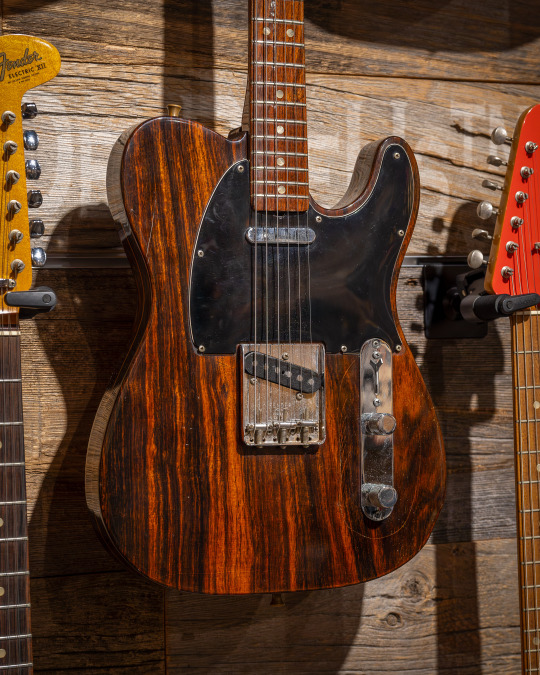
I can count on 1 hand* the number of real ones I have seen in my lifetime...
1969 Fender Rosewood Telecaster.
Everyone knows the first Rosewood Tele was a gift to George Harrison in 1968, but Fender historian Martin Kelly, co-author of the (unofficial) Fender Bible, "Fender The Golden Age 1946 - 1970", says in an article by @rodbrakes for guitarplayer.com, that Harrison's prototype was made with 4 pieces of rosewood (two for the top and two for the back, sandwiched together with a thin layer of maple in between) while production units like this one were made from a one piece top & back (still with the thin maple layer between them though).
Another big difference between Harrison's and the production models is that Harrison's didn't have a "skunk stripe". Instead it had a typically mid-late 60s "capped" neck, i.e. a glued on rosewood fretboard board. Production models had the more traditional 1 piece neck, which Fender moved back to in 1969, in which a channel was routed in the back to insert the truss rod and then filled afterwards (in this case with maple).
*actually on one finger! In the same article quoted above, Martin Kelly reckons no more than 300 were made!
#guitar#guitars#guitarphotography#fender#vintageguitars#toronto#electricguitar#vintagegear#tele#telecaster#rosewood telecaster#george harrison#beatles
25 notes
·
View notes
Note
Hi, I am trying to write a homosexual book that takes place in the 20s. I am unsure where to start and how bad the 20s was for homosexuality so if you have any tips it would be appreciated. Thank you for reading.
Homosexuality in Historical Fiction
I'm going to answer this in two parts: (1) Tips for writing queer historical fiction, and (2) the 1920 gay culture.
Get Your Language Right
Vocabulary is key to capturing how homsexual people identified themselves and interacted with one another at the time. Consider:
The kind of language/code used at the time. For example, gay men in the 1950-60s would have spoken Polari to skirt UK’s strict anti-homosexuality laws. This might mean your characters say seemingly ridiculous things like, “Bona to vada your dolly old eek!” (good to see your nice face)
Authenticity vs. Sensitivity. We don’t need to perpetuate old slurs just because they were used “at the time”. Would the readers of today (your target audience) be accepting towards use of such language?
Is it really necessary? Just like in the case of foreign languages and dialects, it may be better to just refer to the code/secret language being spoken rather than overdoing it in dialogue. Also, does your character identify themselves as a part of this community at all?
Balance Between Struggle and Hope
Often in historical LQBTQ+ fiction, if the conflict is badly written, the readers are just going to feel angry and frustrated. Because:
Even the likable, otherwise reasonable characters won't be able to accept homosexuality easily, often opposing it downright.
Homosexual characters may be confused, struggle with self-doubt and self-hatred (which can't be fun to read, obviously)
The norms of the time make any “resolution” rather disappointing (compared to modern times).
Your goal is to juggle between these strong negative emotions to convey the central message and let hope shine through. Linger too much on negativity and your novel will be dark, but treating these themes 'lightly' will make you sound shallow.
So, treat oppression just as you would write a physical antagonist. It's powerful and a possible life-threatening opposition to the Lead, but it has flaws, loopholes and needs time to regroup before it hits our Lead again with increased force.
+ General Tips
Beware of giving your characters hindsight. As a writer, we know what happened both before and after the time period the characters live through, but they don't! The characters not being able to predict what comes can be a good tragic element.
The word “homosexual” wasn’t coined until 1869, and didn’t become common parlance until the early 20th century. From at least the very early 17th till the mid-19th century, the most common term for women was “tribade,” referring to the act of tribadism (scissoring). Some people used the term “fricatrice.” In the 18th century, “lesbian” and “Sapphist” started to become more common terminology. Men were called sodomites and pederasts (a word which didn’t have the paedophilic connotation it does today). The word “homophile” was coined in 1924 and was most commonly used by gay men and lesbians in the 1950s and 1960s.
“Gay” didn’t take on the almost exclusive meaning of homosexual until the 1960s, and even then, it was still used in the old sense of “merry” more than a few times. Only in the 1970s did it finally emerge as the most popular, mainstream word.
Less suspicions were aroused by a lesbian couple living together for decades than a gay male couple. Many people assumed they were just two very close spinster friends, not that it was a Boston marriage. There were many more questions about why two men would want to live together.
To avoid the very real risk of jail, lobotomy, conversion “therapy,” or the loonybin, sometimes a gay and lesbian couple would enter a ménage à quatre. Though it appeared on the surface as though two straight couples lived in the same duplex or right next door, they were actually just lavender cover marriages. Some had children (through various means) and co-parented.
Photo booths were seen as a safe space where a same-sex couple could kiss, cuddle, and embrace without fear of arrest or public suspicion.
Some lesbian couples were able to adopt children as single women, in jurisdictions which permitted that. More daring couples underwent artificial insemination and then went abroad to give birth, coming home with “adopted babies.”
Similar to the handkerchief code in the BDSM community, some gay men signalled to one another with red neckties and green carnations. Parisienne lesbians signalled to one another with violets in their hair.
There’s a long history of gay bathhouses, dating back centuries. Since male homosexuality was illegal and severely punished, a bathhouse was among the few places it was safe to meet potential partners and engage in sexual activity. Even the very real fear of police raids didn’t deter patrons. Manhattan, Paris, and London were home to many famous (and luxurious) gay baths, but there were plenty of lesser-known ones in other cities.
While not everyone was lucky enough to have a lavender ménage à quatre, many people had individual lavender marriages. Sometimes the spouse knew s/he was serving as a cover, sometimes not.
There were also more “traditional” ménage à trois marriages, composed of the lavender couple plus the true same-sex partner all living together. Sometimes these arrangements were composed of a bisexual plus a partner of each sex.
People did NOT casually out themselves! They could only confide their secret to other confirmed friends of Dorothy and extremely radical allies who had proven they could be trusted and wouldn’t turn on them.
You don’t have to make your straight characters raging, violent homophobes, but it’s completely unrealistic and historically inaccurate to show them all immediately, unquestioningly, lovingly accepting their friends’ homosexuality if the secret comes out. They might agree to not let anyone else know, but the friendship would probably be over. Other people, a bit more open-minded, might eventually reconcile but never be able to completely shake the belief that their sexual orientation is unnatural, strange, or wrong. Some people might only come around after decades of estrangement and realising gays and lesbians are just like everyone else.
To avoid discovery, some lesbians called one another by male names in their letters. Some liked those nicknames so much they continued using them in real life.
1920 Gay Culture
The United States - The Roaring Twenties
As the United States entered an era of unprecedented economic growth and prosperity in the years after World War I, cultural mores loosened and a new spirit of sexual freedom reigned.
Harlem’s famous drag balls were part of a flourishing, highly visible LGBTQ nightlife
"Pansy Craze”: gay, lesbian and transgender performers graced the stages of nightspots in cities
lesbian and gay characters were being featured in a slew of popular “pulp” novels, in songs and on Broadway stages (including the controversial 1926 play The Captive) and in Hollywood—at least prior to 1934, when the motion picture industry began enforcing censorship guidelines, known as the Hays Code. Heap cites Clara Bow’s 1932 film Call Her Savage, in which a short scene features a pair of “campy male entertainers” in a Greenwich Village-like nightspot. On the radio, songs including "Masculine Women, Feminine Men" and "Let’s All Be Fairies" were popular.
On a Friday night in February 1926, a crowd of some 1,500 packed the Renaissance Casino in New York City’s Harlem neighborhood for the 58th masquerade and civil ball of Hamilton Lodge.
Nearly half of those attending the event, reported the New York Age, appeared to be “men of the class generally known as ‘fairies,’ and many Bohemians from the Greenwich Village section who...in their gorgeous evening gowns, wigs and powdered faces were hard to distinguish from many of the women.”
The tradition of masquerade and civil balls, more commonly known as drag balls, had begun back in 1869 within Hamilton Lodge, a black fraternal organization in Harlem. By the mid-1920s, at the height of the Prohibition era, they were attracting as many as 7,000 people of various races and social classes—gay, lesbian, bisexual, transgender and straight alike.
London - Balls and Adverts
Like other large cities at the time, London was home to many drag balls and nightclubs where the gay community could express themselves.
"Lady Austin's Camp Boys" (1933): At a private ballroom in Holland Park Avenue, west London, 60 men were arrested in a police raid after undercover officers had watched them dancing, kissing and having sex in make-up and women's clothes. But despite facing a lengthy prison term and disgrace, the organiser, "Lady Austin", told officers: "There is nothing wrong [in who we are]. You call us nancies and bum boys but before long our cult will be allowed in the country."
Other gay men found partners through personal advertisements, which could be an equally risky strategy.
In 1920 the publisher of a magazine called the Link and three gay subscribers were each sentenced to two years of hard labor on charges of indecency and conspiring to corrupt public morals.
Some adverts even appeared in the national press, such as the Daily Express, although they were not quite so blatant. People would ask for 'chums' of their own sex and offer to take people on holiday.
One man responding to an advert in the Link wrote that he was "very fond of artistic surroundings, beautiful colours in furniture and curtains, and softly shaded lamps and all those beautiful things which appeal to the refined tastes of an artistic mind". He added: "All my love is for my own sex", and wrote that he longed to give his love "in the most intimate way".
Gay adverts often had references to Edward Carpenter, Oscar Wilde and Walt Whitman, or would say 'I have an unusual temperament'.
Berlin - The Weimar Republic
The Weimar Republic, Germany’s first parliamentary democracy lasted from 1918 until 1933 and was a time of progressive cultural renaissance from cinema, theater and music, to sexual liberation and a flourishing LGBTQ scene.
Berlin was home to around 40 known queer bars, a number which had doubled by 1925. The cabaret bars and clubs like Eldorado were packed to the brim with lust, tassels, glitter and flamboyance.
Drag shows were the norm and stars like Marlene Dietrich (a Berlin-native) and Josephine Baker who were icons for the queer community, performed regularly in Berlin’s lavish halls.
Kiosks sold an array of well known queer publications like Die Hoffnung (The Hope), Blätter für Menschenrecht (Leaflets for Human Rights), Frauenliebe (Woman Love), and Das dritte Geschlecht (The Third Sex).
As homosexuality was still illegal, Berlin’s Tiergarten and other parks, Nollendorferplatz as well as train stations and the infamous octagonal public bathrooms
Underground spaces flourished.
Here's a list of books with an LGBTQ+ POV character, set at least partly in the 1920s:
Self-Made Boys: A Great Gatsby Remix
Dead Dead Girls (Harlem Renaissance Mystery, #1)
In the Field
The Lady Adventurers Club
Last Call at the Nightingale (Nightingale Mysteries, #1)
A Good Year
The Last Nude
The Sleeping Car Porter
Once a Rogue (Roaring Twenties Magic, #2)
Slippery Creatures (The Will Darling Adventures, #1)
Crazy Pavements
References
https://www.bbc.com/culture/article/20180212-polari-the-code-language-gay-men-used-to-survive
https://www.theguardian.com/uk/2004/jul/03/gayrights.world
https://www.history.com/news/gay-culture-roaring-twenties-prohibition
#writers block#writers and poets#writing#creative writing#writers on tumblr#creative writers#helping writers#poets and writers#writeblr#resources for writers#let's write#writerscommunity#writers#writer#write#female writers#writer things#how to write#author#write every day#write it#write anything#write up#write that down#writing advice#writing community#writing tips#writing inspiration#writing prompt#on writing
87 notes
·
View notes
Text
Mini Lolita Fashion History Lesson: MILK
Today, MILK is generally known as an 'otome' or 'girly' brand, and many of their modern items don't look like what modern lolita think of as lolita.
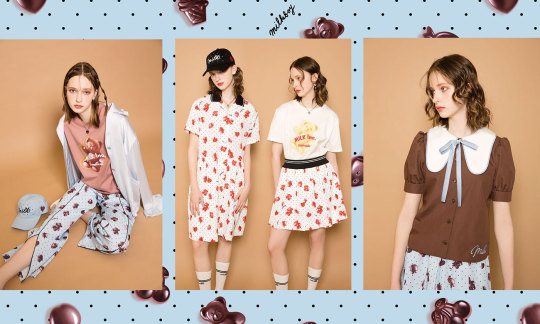
A recent MILK collection However, in the late 80s and early 90s, MILK was considered to be one of the quintessential Lolita brands.
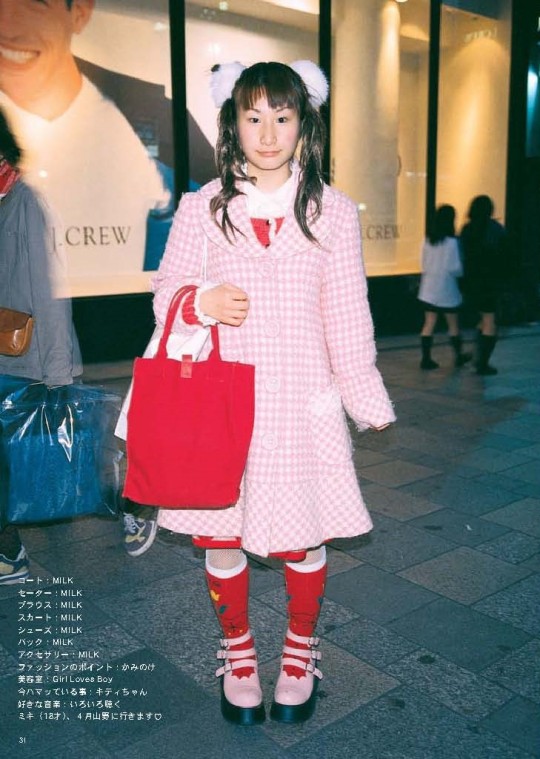
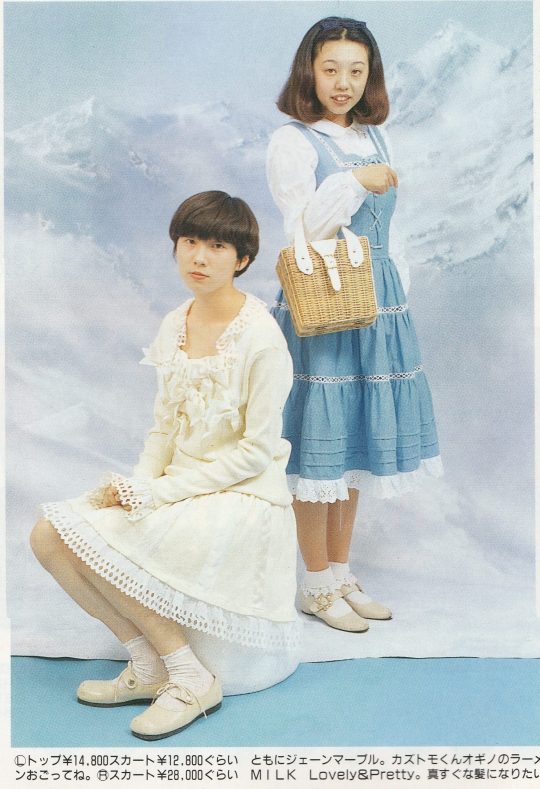
1990s lolita wearing MILK In a 1994 zipper interview about the history of lolita fashion the brand representative for MILK states "I think what is now called lolita fashion is the fashion that milk has been making for a long time."
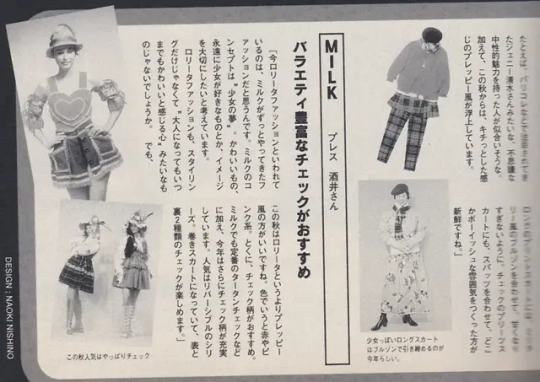
MILK was founded in 1970 by Hitomi Okawa (大川ひとみ). When Hitomi Okawa started as a designer there were not many DC brands yet and ready to wear fashion was really just starting to become more widespread in Japan. Okawa attended an art university in Kyoto because of a love of drawing that started in elementary school. She used to draw illustrations of girls and make things like paper dolls. At the age of 11, she drew many pictures of the same clothes and changed the patterns (polka dots, checks, flowers). She grew up the daughter of a doctor, in an affluent home where her mother would read magazines like Harper's Bazaar with 1950s and 1960s American fashion. She also looked at American fashion catalogs as a child, and cites this study of clothing in magazines and catalogs as her earliest sort of "studying" of fashion.
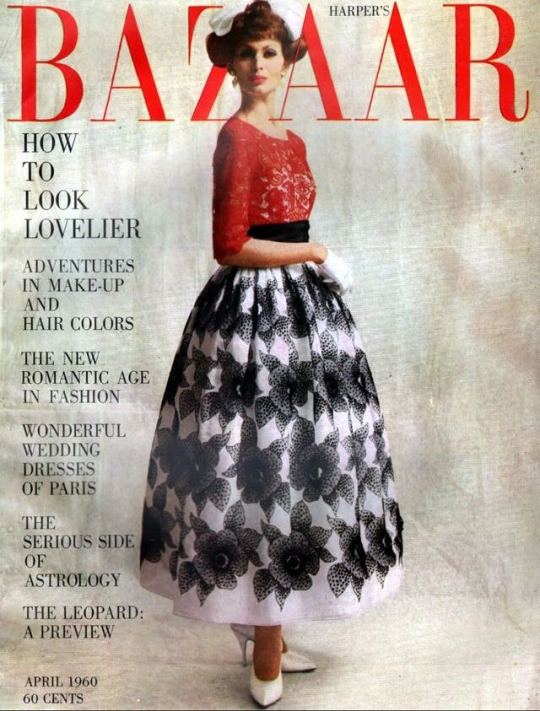
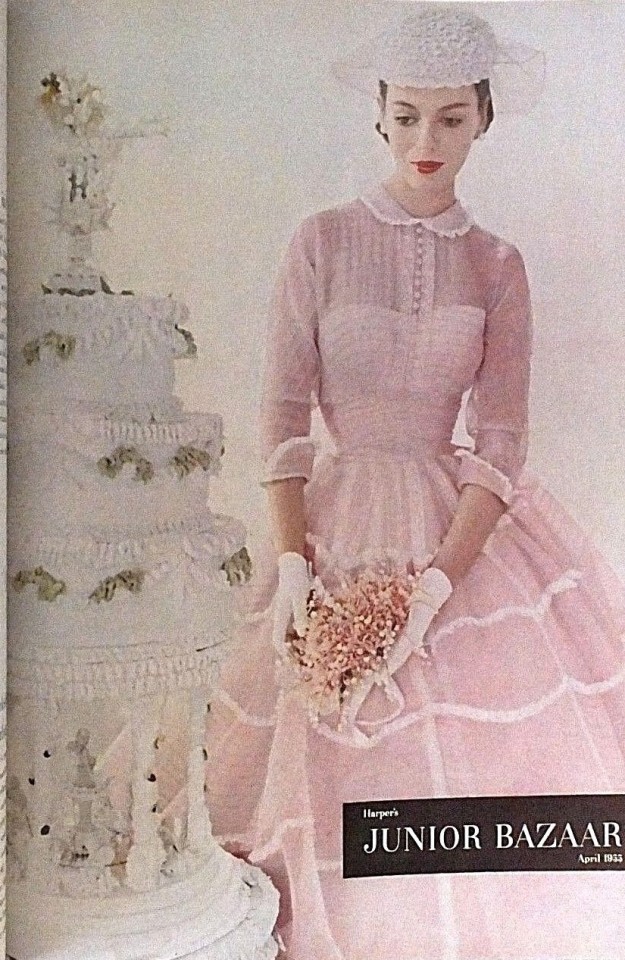
50s/60s Harper's Bazaar In addition to drawing inspiration from the 50s & 60s Harper's Bazaar & American clothing catalogs, she also drew inspiration from military uniforms and how they have custom buttons and custom fabric and details like that, as well as current trends in London and Tokyo as the brand continued to develop. When she started however, she says that she was the only one making this sort of cute girly clothing in Japan and she felt like she had to make it because no one else was making what she wanted to wear.
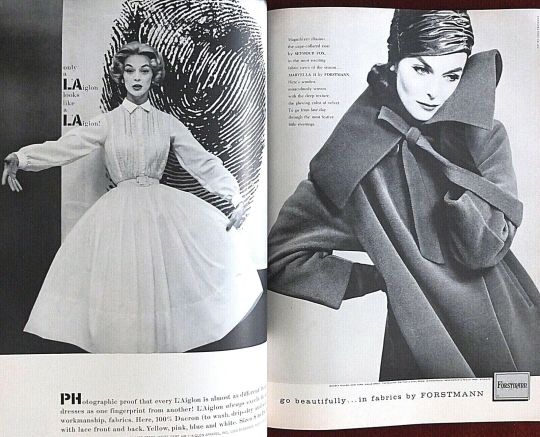
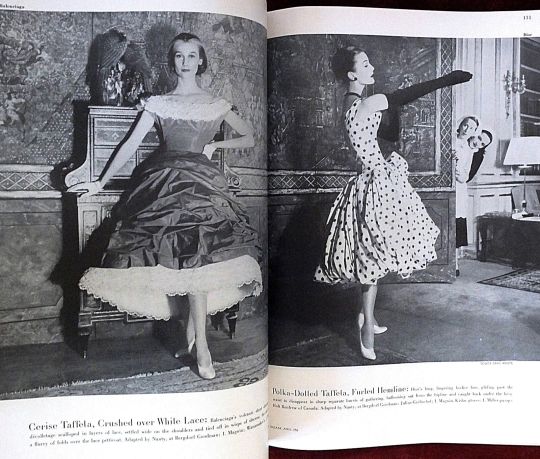
50s/60s Harper's Bazaar
After graduating from Seian College of Art and Design, Department of Design, she started MILK in Harajuku. She wanted to start in the coolest place possible, so she decided on Central Apartment.

MILK Shop Front in the 70s, Central Apartment
She had come to Harajuku when she was either in High School or her first year of University and had stood in the middle of the pedestrian bridge right off Harajuku station, and she looked down at Omotesando and thought "Here is the coolest place, I want to be here!", and that's why she chose that location. The Bridge doesn't exist any more, it was torn down in 2011. She wasn't aware at the time that Central Apartment was a popular place for creators, she just thought that street was nice and that Central Apartment was modern and cool. In a 2021 interview she confessed that she sometimes still goes up to the pedestrian bridge on the Yoyogi Park side and looks at Omotesando, and when she does, she feels the same way she did when she was 20 years old.
Central Apartment (原宿セントラルアパート) was initially an apartment complex built in Harajuku in 1958 at the intersection of Meiji-dori. It was initially built for special international travelers like US military personnel. In the mid 1960s/early 1970s, the lower floors were converted into stores with offices in the upper apartment floors.
The Coffee shop Leon on the first floor was a popular spot with creative people. There were also shops like Mademoiselle Nonnon launched by designer Taro Aramaki which sold French style clothing and lots of horizontal stripes. Mademoiselle Nonnon is considered to be the source of the border (horizontal stripe) trend in Japan.
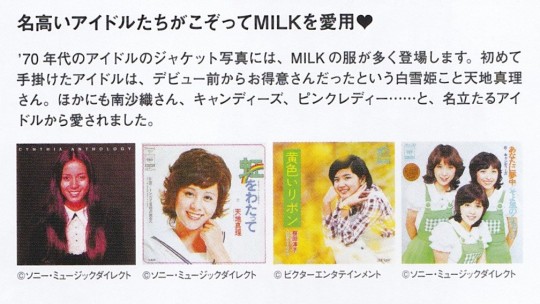
Initially, "MILK", was expensive and unrealistic for everyday wear, so it was mainly used as a stage costume for idols, however, people started wearing Milk as everyday clothing as time went on.
MILK also experimented with a Bridal line in the 70s as well.
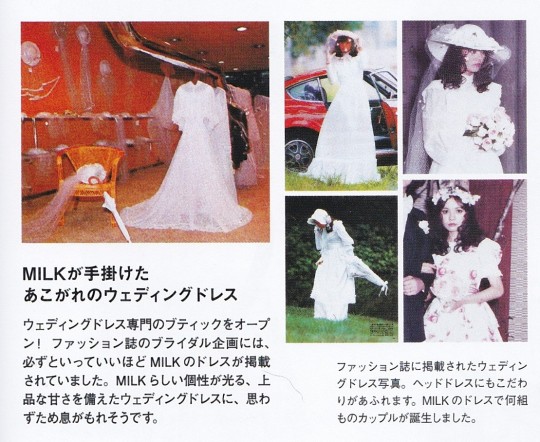
While their runway looks were generally a bit more loud than the way the pieces would have been worn in real life, you can see some prairie revival influence their early 70s items as well as some silhouettes in the '76 collection that are starting to look more lolita-esque.
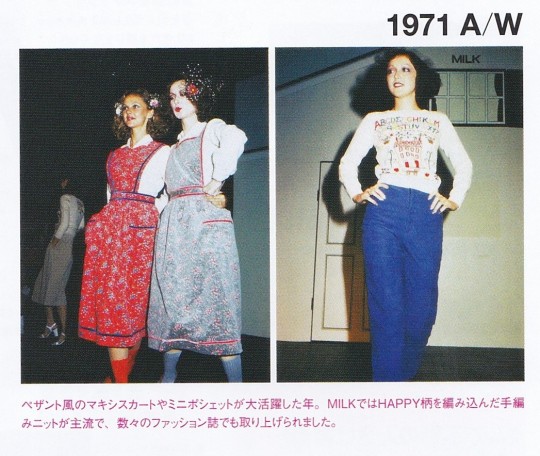
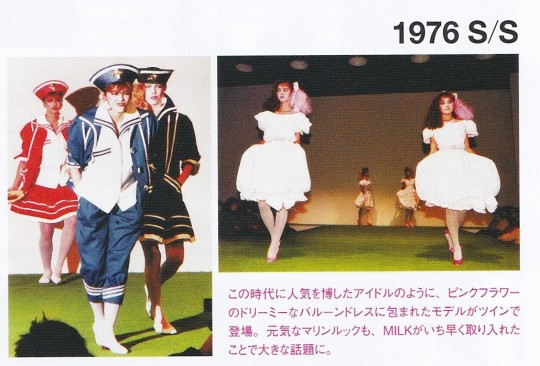
Here are a few runway examples from the 1980s, note the border print of a carousel in the 1988 collection and the knee length ruffled skirt in the 1982 one.
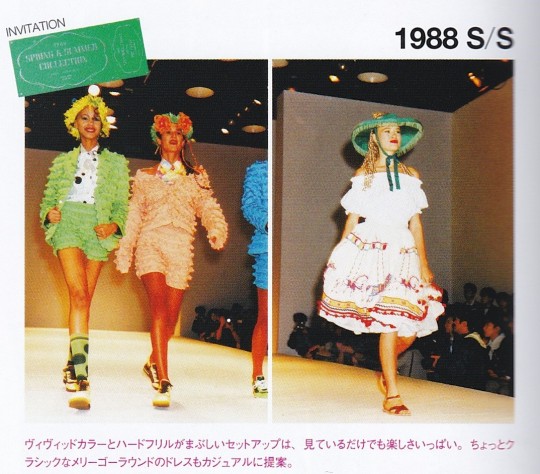
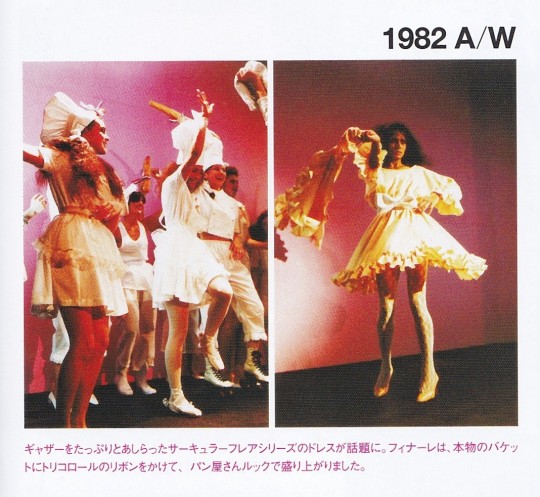
By the early 1990s, MILK was heavily featured in coordinates worn by young women who considered themselves lolita in magazines like Cutie and Zipper, and was also advertising in those magazines.
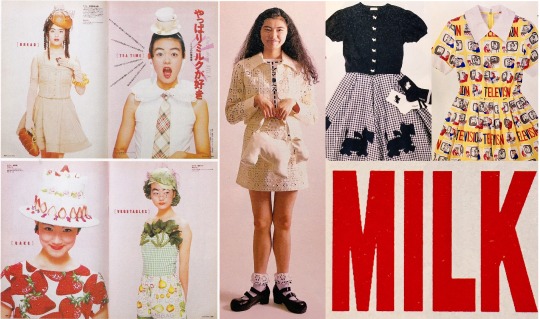
1990-1992 Cutie advertisements for MILK
Early 1990s looks from MILK were fairly consistent with what was on offer from similar shops like PRETTY and Shirley Temple.
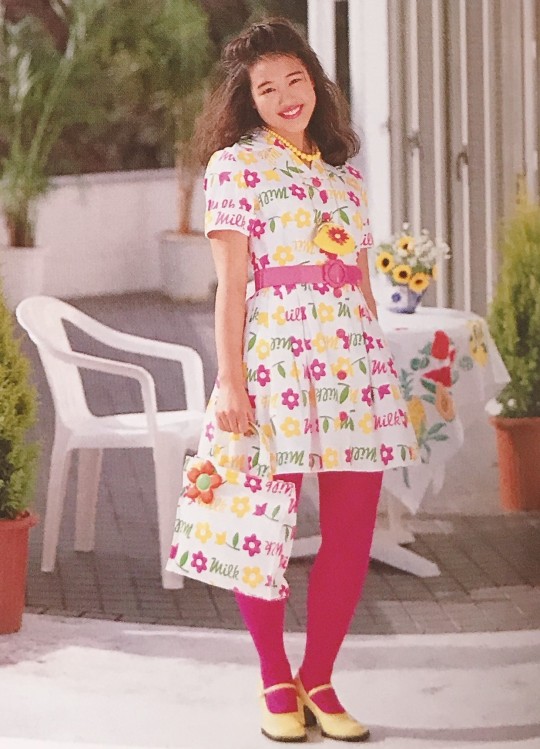
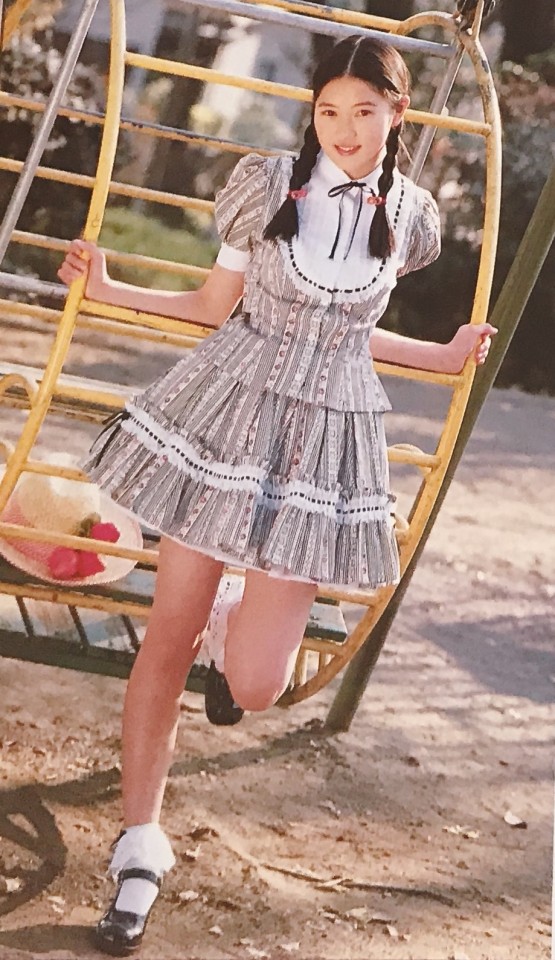
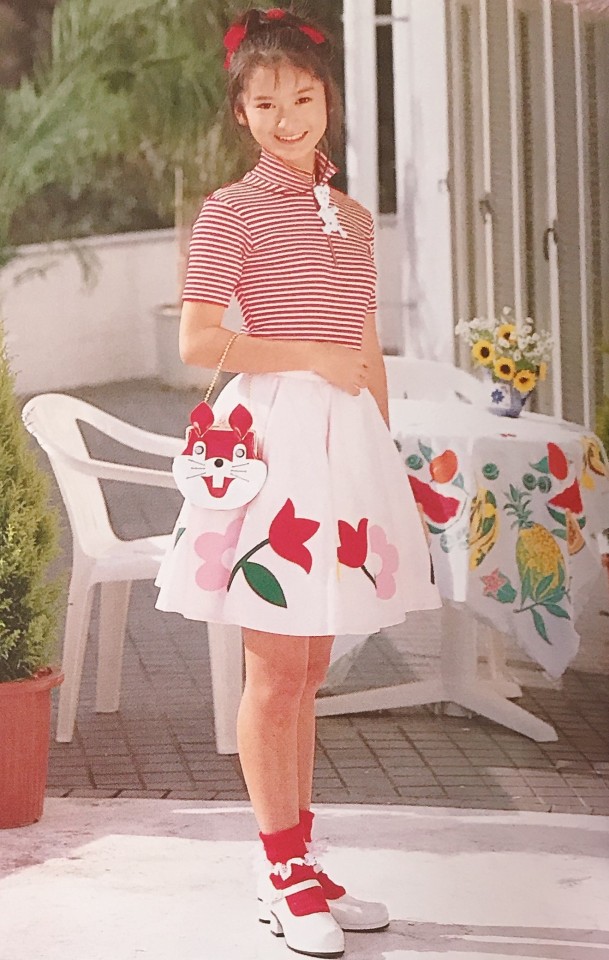
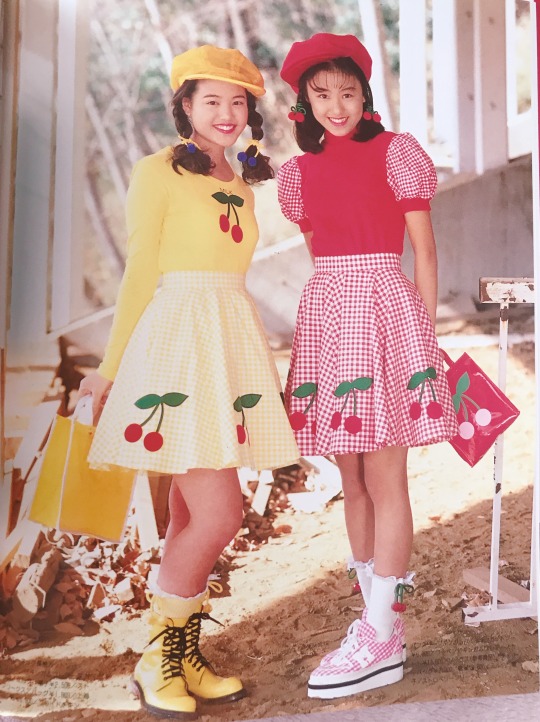
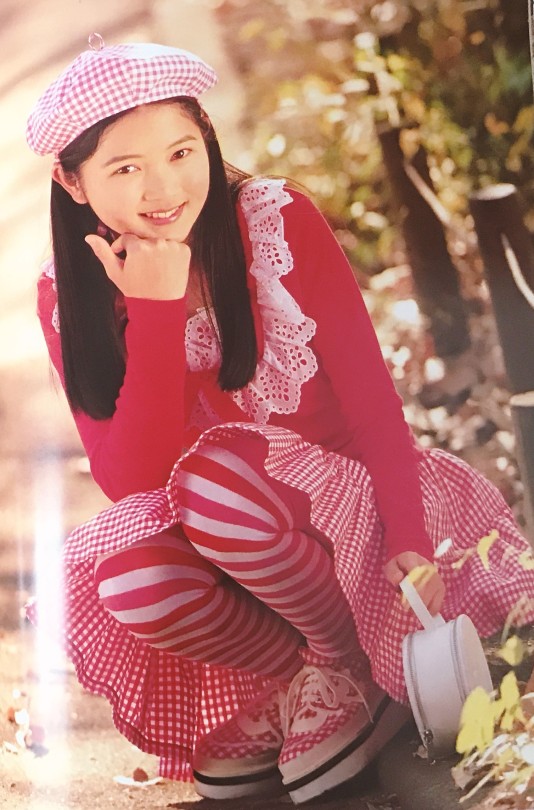
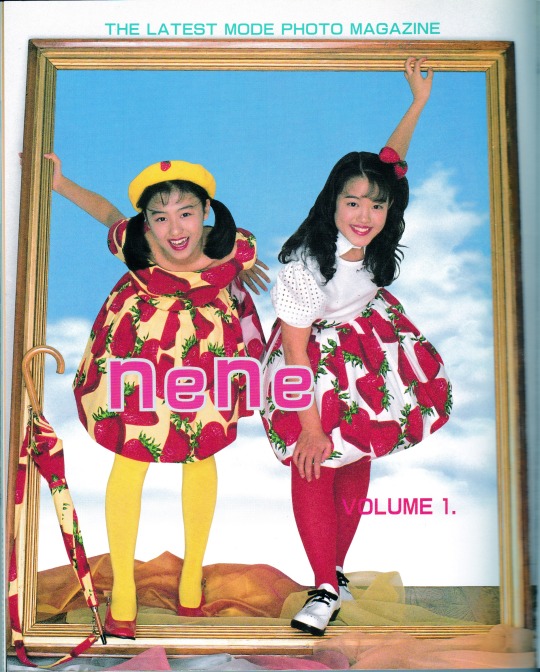
MILK Coordinates from Nene magazine, 1995
Speaking of Shirley Temple, the founder of Shirley Temple, Rei Yanagawa (柳川れい), worked as a designer for MILK before starting the Shirley Temple children's brand in 1974.
As time went on, lolita fashion started to diverge from the MILK style, while MILK followed their own design concept and look more at current trends in girly fashion. Today, some iconic MILK items like their heart purse are still frequently used in lolita fashion, however, it would be difficult to walk into MILK today and put together a coordinate that would read the same as one made from items at Angelic Pretty.
While goth and punk brands typically have no issue relating themselves to goth or punk fashion, brands popular with lolita have sometimes resisted self-describing themselves as lolita, most likely in an attempt to not alienate non lolita customers, due to lolita fashion having a mixed reputation. MILK, like many other Japanese brands, especially DC brands, maintains that they make MILK style, even though their influence on what we call lolita fashion today, is unmistakable.
Past Posts: Olive Girls
#MILK#Old School Lolita#Lolita Fashion History#Shirley Temple#90s Jfashion#80s Jfashion#70s Jfashion#Lolita History#Central Apartment#Hitomi Okawa#Mini Lolita History Lesson
349 notes
·
View notes
Text
Hazbin hotel as humans PART 2:
Husk:
He could easily have died in 1975, which, if he was born in 1912, would make him around 63
I would assume husk is in his late 50s early 60s
And suspenders were popular in the early 20th century, during the 1960s, and in the mid-1970s-1980s -
And husk failed as a magician. The golden age of magic was around the 1880s to the 1930s.
So when he was in his 20s in the 1930s magicians could've been out of style and it'd explain why he failed as a magician.
I would assume he lived in Los vegas. Because big casinos and magicians and bars. Were a thing.
This was the popular hair in the 60s:
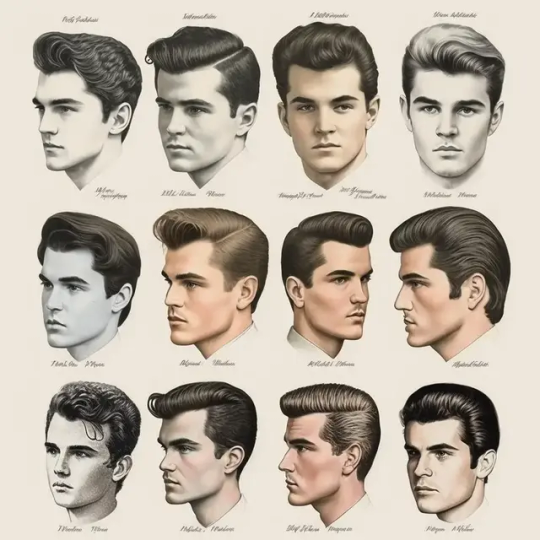
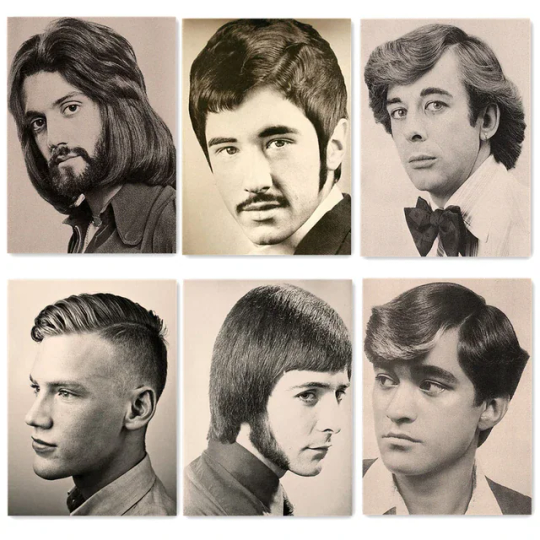
And this was the clothing I think husk would've wore I nthe 50s-60s:
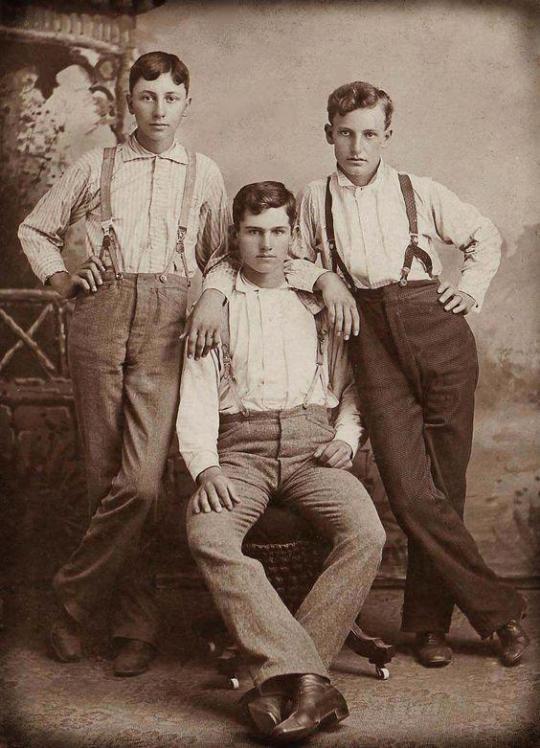
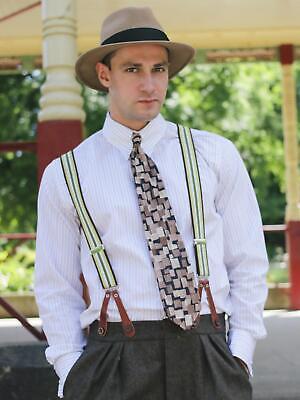
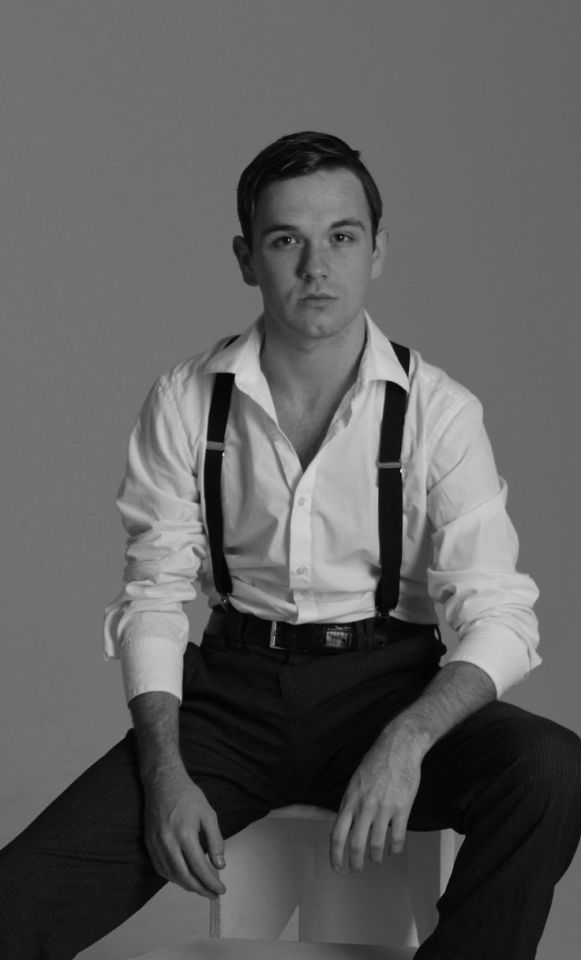
-------------------------------------------------------
Nifty:
She looked like she died in the 50s, and I think its cannon she's 22, so she was born around the late 30s and early 40s.
And it's noticeable she was a housewife. Maybe she wasn't ever crazy.
honestly? She reminds me of housewife radio. That seems like it's her background story she completely lost it.
Psychotic breakdown to the max.
I think she would've worn this:
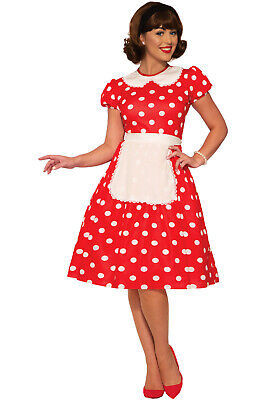
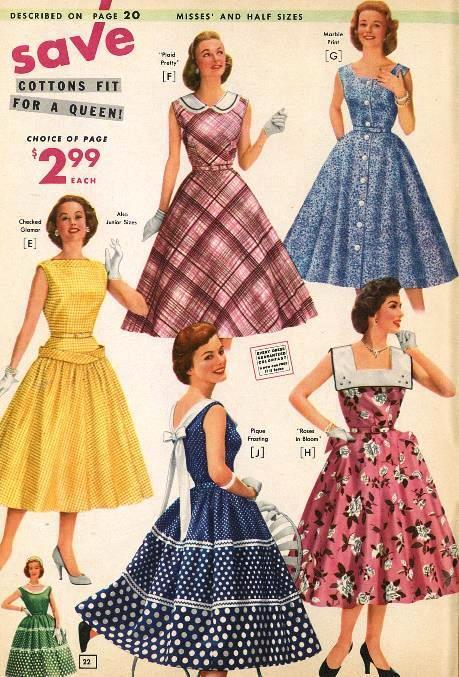
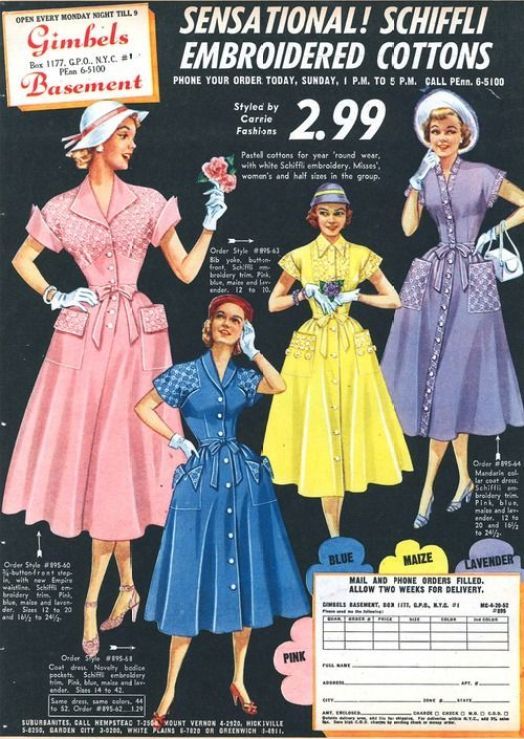
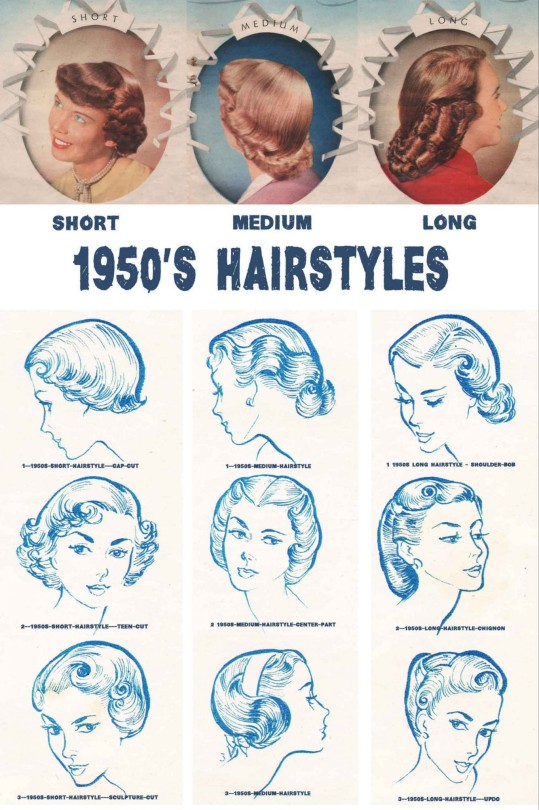
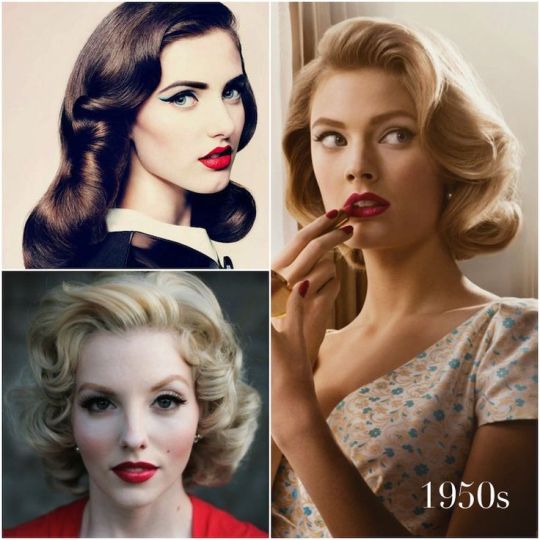
#hazbin hotel#hazbin alastor#alastor#lucifer hazbin hotel#charlie morningstar#hazbin nifty#nifty hazbin hotel#nifty#husker hazbin hotel#hazbin hotel husk#hazbin husk#huskerdust#hazbin hotel fanart
125 notes
·
View notes
Text
"Early Mornin' Rain" (1971-1972) + "Aloha From Hawaii" bonus performance (1973)
Recorded by Elvis Presley on March 15, 1971 at RCA's Studio B in Nashville, Tennessee · First released on the album Elvis Now on February 20, 1972.
RECORDING SESSION Studio Session for RCA March 15, 1971: RCA’s Studio B, Nashville. With a three-album agenda before him, Elvis arrived on the first day of the sessions with a runny nose and aching eyes. Yet he was determined to go ahead, and his enthusiasm seemed inspired by an unlikely source: contemporary folk music. The spate of home taping he’d done during the soundtrack years reveals that Elvis had been tuned in to the folk boom since the mid-’60s, and it was through the sweet harmonies of Peter, Paul and Mary that he was introduced to songwriters like Bob Dylan and Gordon Lightfoot. With Charlie and Red he’d harmonized for hours on songs like “Blowin’ In The Wind” and “500 Miles”; now Elvis had been listening to Peter, Paul and Mary’s interpretations of songs like “The First Time Ever I Saw Your Face,” “Early Morning Rain,” “(That’s What You Get) For Lovin’ Me,” and Dylan’s “Don’t Think Twice, It’s All Right” and “I Shall Be Released.” Eager to work with similar textures himself, Elvis picked up on a suggestion from Charlie Hodge and brought in a male-female quartet, the Nashville Edition, to help on the sessions. The rest of the evening was devoted to Peter, Paul and Mary’s two Gordon Lightfoot numbers, “Early Morning Rain” and “For Lovin’ Me,” both grounded in the same sound: Restrained brushes from Jerry Carrigan’s drums, blended with a simple, effective bass line from Norbert Putnam. “Are you gonna play something with me?” James Burton prodded Chip Young, initiating a friendly duel between the two on acoustic guitar licks. Charlie McCoy (“the fastest harp in the West,” as one of his later solo albums dubbed him) took the solos. Each of the songs was true to its genre, but they lacked the feel the singer brought to any song when he was at his best. Elvis was having trouble. “Give me a Kleenex or something,” he asked Charlie, snorting in every pause, struggling to keep his nose clear and his voice open. After the evening sessions he checked into a Nashville hospital for treatment of what turned out to be secondary glaucoma. Elvis had been having problems with his eyes for the last few years, and no one who watched him record that night was surprised at his hospitalization.
Excerpt: "Elvis Presley, A Life in Music: The Complete Recording Sessions" by Ernst Jorgensen. Foreword by Peter Guralnick (1998)
--
"Early Mornin' Rain" PRIOR RECORDINGS AND RELEASES Gordon Lightfoot wrote “Early Morning Rain” in 1964 but only recorded the song himself later, releasing his recording on the 1966 album "Lightfoot."
youtube
Before Lightfoot released his own recording, the song was recorded and released in 1965 by Ian and Sylvia, a Canadian songwriting and performing duo. Source: thesongbook.org
youtube
Peter, Paul and Mary, also folk revival stars, had a hit with Lightfoot’s song that year, as it reached No. 91 on the Billboard Top 100. Source: thesongbook.org
Peter, Paul & Mary - Live on the "Tonight In Person" Show (1966)
youtube
HONORABLE MENTIONS Going to more experimental recordings, more Rock and Roll was put into the tune by the groups The Grateful Dead and We Five. The Grateful Dead recorded the song in 1965 but their recording was only released in 2001 on the album The Golden Road (1965-1973) and again on the album The Birth Of The Dead in 2003. Here's their version:
youtube
We Five released their cover still in the 70's on the album Catch The Wind (1970).
youtube
ELVIS' VERSION (1972) With Elvis’ version, Gordon Lightfoot’s most famous song features the male-female quartet The Nashville Edition. The studio version was recorded in March 1971 and released almost a year later in February 1972 on the album Elvis Now.
youtube
ALOHA FROM HAWAII (1973 — U.S. AIRING) "Early Mornin' Rain" is one of the inserted songs on the Aloha From Hawaii TV special. A live performance of Elvis' 1972 release was specially taped onstage at the H.I.C Arena, Honolulu, Hawaii, following the January 14, 1973 concert, with no audience at the venue anymore. The footage - along with 4 more bonus tracks - was requested for the US airing by NBC (April 4, 1973). In total 5 songs were live performed by Elvis in January 14, 1973 in addition to the concert setlist itself. They were almost all Hawaiian-themed songs taken from the soundtrack album "Blue Hawaii" released in 1961 ("KU-U-I-PO", "Hawaiian Wedding Song", "Blue Hawaii" and "No More") with the exception of one, "Early Mornin' Rain". However when the concert aired in the U.S. on April 4, 1973 (NBC), the live performance of "No More" was left unused while "Early Mornin' Rain" apparently was a definitive track for the American airing of the 1973 Elvis special, for some reason. Director Marty Pasetta used split screens to show Elvis singing (he is alone on screen, no musician was shown behind him as usual for his live performances) while the rest of the screen was completed with scenes filmed in Hawaii - from staged romantic scenes to Hula dancers - showing the peaceful beauty of the island. Below we have the raw footage and then the final edit that aired in the U.S. television post concert.
MUSICIANS: Guitar: James Burton, John Wilkinson, Elvis Presley, Charlie Hodge. Bass: Jerry Scheff. Drums: Ronnie Tutt. Piano: Glen D. Hardin. Vocals: Kathy Westmoreland, The Sweet Inspirations, J.D. Sumner & The Stamps, Joe Guercio and His Orchestra.
youtube
AUTHOR'S NOTE: Since "No More" was the only other non-Hawaiian-themed song to be taped for the Aloha From Hawaii airing in the U.S., I wonder what made Marty Pasetta decide to chose "Early Mornin' Rain" to complete the final cut of the Aloha special for the U.S. audience. Considering "No More" has the Hawaiian feeling present in its sound, which would make the song fit very well on that TV special and the vibe of the 3 other songs selected as - per say - bonus material, why it was left out? Perhaps it was a request from Elvis? Or either a request from the Colonel Parker and RCA Records, in a try to boost the sales of Elvis' last contemporary album released previously, in 1972, in which that song was released? I haven't read any books specifically about the Aloha From Hawaii yet, so if you happen to know something about the selection of the songs for this extra portion of the Aloha From Hawaii special, please, share it in the comments.
All I know it that I was really happy to see "Early Mornin' Rain" performed live on the Aloha From Hawaii special because I absolutely LOVE Elvis' recording of this song. I think Elvis' cover of that classic Gordon Lightfoot penned-tune remains oddly underrated.
#elvis presley#gordon lightfoot#elvis history#elvis music#elvis songs#'Early Mornin' Rain'#1971#elvis discography#elvis albums#elvis now#1972#aloha from hawaii#1973#elvis#70s elvis#elvis the king#Spotify#Youtube
23 notes
·
View notes